democracynow.org
Stories:

Hillary Clinton Becomes First Woman to Accept Major-Party Presidential Nomination in U.S. History
Former Secretary of State Hillary Clinton has made history by becoming the first woman to accept a major-party presidential nomination. "Tonight, we’ve reached a milestone in our nation’s march toward a more perfect union: the first time that a major party has nominated a woman for President," Clinton said. "Standing here as my mother’s daughter, and my daughter’s mother, I’m so happy this day has come."
TRANSCRIPT
This is a rush transcript. Copy may not be in its final form.
AMY GOODMAN: This is Democracy Now!, democracynow.org, "Breaking with Convention: War, Peace and the Presidency." I’m Amy Goodman. In an historic moment, former Secretary of State Hillary Clinton has become the first woman to accept a major-party presidential nomination.
HILLARY CLINTON: Tonight, we’ve reached a milestone in our nation’s march toward a more perfect union: the first time that a major party has nominated a woman for president. Standing here—standing here as my mother’s daughter and my daughter’s mother, I am so happy this day has come. I’m happy for grandmothers and little girls and everyone in between. I’m happy for boys and men, because when any barrier falls in America, it clears the way for everyone. After all, when there are no ceilings, the sky’s the limit. So let’s keep going. Let’s keep going until every one of the 161 million women and girls across America has the opportunity she deserves to have.
AMY GOODMAN: Speaking at the Wells Fargo Center here in Philadelphia, Hillary Clinton thanked her Democratic rival, Senator Bernie Sanders.
HILLARY CLINTON: And I want to thank Bernie Sanders. Bernie—Bernie, your campaign inspired millions of Americans, particularly the young people, who threw their hearts and souls into our primary. You’ve put economic and social justice issues front and center, where they belong. And to all of your supporters here and around the country, I want you to know, I’ve heard you. Your cause is our cause. Our country needs your ideas, energy and passion. That is the only way we can turn our progressive platform into real change for America.
AMY GOODMAN: The final night of the Democratic convention featured singer Katy Perry, basketball legend Kareem Abdul-Jabbar and retired four-star Marine General John Allen. Khizr Khan also spoke. He’s the father of U.S. Army Captain Humayun Khan, who was posthumously awarded the Bronze Star and Purple Heart after he was killed in Iraq.
KHIZR KHAN: Donald Trump, you’re asking Americans to trust you with their future. Let me ask you, have you even read the United States Constitution? I will—I will gladly lend you my copy. In this document, look for the words—look for the words "liberty" and "equal protection of law." Have you ever been to Arlington Cemetery? Go look at the graves of brave patriots who died defending United States of America. You will see all faiths, genders and ethnicities. You have sacrificed nothing and no one. We cannot solve—we cannot solve our problems by building walls, sowing division. ... Read More →

Keeanga-Yamahtta Taylor vs. Janaye Ingram on Hillary Clinton, Racial Justice & the Democratic Party
To discuss Hillary Clinton’s historic nomination and how the Black Lives Matter movement is reflected in the Democratic platform, we are joined by Keeanga-Yamahtta Taylor, author of "From #BlackLivesMatter to Black Liberation" and an assistant professor of African-American studies at Princeton University, and Janaye Ingram, the former executive director of the National Action Network and a member of the 20/20 Leaders of America.
TRANSCRIPT
This is a rush transcript. Copy may not be in its final form.
AMY GOODMAN: This is Democracy Now!, democracynow.org. This is "Breaking with Convention: War, Peace and the Presidency," our two-hour daily two-week special from the Republican and, this week, the Democratic National Convention in Philadelphia.
To talk more about the historic nomination of Hillary Clinton and how the Black Lives Matter movement is reflected in the Democratic platform, we’re joined now by two guests. Keeanga-Yamahtta Taylor is the author of From #BlackLivesMatter to Black Liberation. She’s an assistant professor of African-American studies at Princeton University. And Janaye Ingram is with us, former executive director of the National Action Network and a member of the 20/20 Leaders of America.
We welcome you both to Democracy Now! Let’s begin with Janaye Ingram. Your response to the nomination of Hillary Clinton last night, the formal acceptance speech that she gave on the floor of the Democratic National Convention, the first woman nominated by a major party to be president of the United States?
JANAYE INGRAM: Well, obviously, I think it’s a proud moment for this country that this has happened, notwithstanding all that has surrounded her nomination. I still believe that her nomination, the first female, is a moment that we need to pay attention to and we need to acknowledge as a history-making moment. I was happy about her speech last night. I think she could have done a little bit more with giving us personal—a personal story. I think, leading up to her speech, you had a lot of the speakers—and the video—you had her daughter talking about her as a person. The speeches in the nights prior, you had people sort of humanizing her and bringing that human touch. I was looking to hear a little bit more from that perspective.
But I was also happy to hear her talk about the Black Lives Matter movement, even though she didn’t specifically call it out. She did mention the fact that black and brown people are being sort of brutalized—that’s my word—brutalized by police. And I will say that was something. That was a recognition to have on a national stage by this candidate, was important to the movement. You had Reverend Barber earlier talk about Black Lives Matter. And so, having that repeated by Hillary Clinton, at least in her way of saying it, was an important moment, that shows, I think, a lot of the pressure that has been placed on her. She is feeling that pressure, and she is responding to it, at least now, with words.
AMY GOODMAN: Keeanga-Yamahtta Taylor?
KEEANGA-YAMAHTTA TAYLOR: So, I guess I was thinking that the speech, along with the convention as a whole, in many ways has demonstrated this gap between the kind of symbolism and the reality that exists on the streets of Philadelphia and around the country. And so, I think that Hillary Clinton gave a speech that was full of platitudes and that, in some ways, I guess, was of symbolic value, but that really lacked any kind of specificity in terms of how we are going to address very serious crises in this country. And so, I think that, to me, that’s part of the problem I kind of walk away with the convention with, is there’s all the talk about how great and wonderful the United States is, and in many ways, obviously, the convention reflected more of the ethnic and gender and sexual orientation diversity in the United States certainly than the Republican hate show last week, but I think that what we’ve learned from the Obama presidency is that we have to move from symbolism into actual policies and programs that are going to improve the lives of everyday, ordinary people. And in the speeches throughout the week and Clinton’s speech last night, I think we’re still waiting for that specificity in how we go from a kind of symbolic representation of people to the actual representation and improvement in the quality of people’s lives on an everyday basis.
AMY GOODMAN: What would you have liked Hillary Clinton to say last night?
KEEANGA-YAMAHTTA TAYLOR: Well, I think the two things that I’m most concerned with have to do with Black Lives Matter and specific policies that are going to be advanced to stop police abuse and violence in black communities. And also, Hillary Clinton gave a very heralded speech in Harlem in February, where she talked about the reinvestment in distressed communities, and that seemed to be something that was completely missing from the speech. So, in a city like Philadelphia, where the Democratic Party has been having this party all week, there’s 28 percent poverty, and half of those people are living in what is defined as extreme poverty. And so, what are the actual policies and practices that are going to be put into place to address that? That’s the concrete details that I wanted to hear about.
AMY GOODMAN: Janaye, why do you think Hillary Clinton is the best person to address the criminal justice system?
JANAYE INGRAM: I don’t know that I would say that she’s the best person. I think she definitely has a—having had the experience that she’s had, she does bring to the table certain criteria that I think would be helpful, as opposed to the person that she’s running against. To say that she’s the best person is not something that I would be comfortable saying. I think, given the two choices—you have Donald Trump, who has talked about essentially creating a law and order state, which when you’re talking about a fractured relationship between police and specifically the black community, that is very troubling and disturbing to hear. So, given the two choices, I think having someone who at least is willing to have the conversation and to recognize that, even if it is platitudes, that it’s important that she says it. I was really waiting to see if it was going to be said by her, to be honest, because, you know, I wasn’t completely sure. But the fact that she actually acknowledged it means that there’s an opportunity there for us to go further and hold her accountable to the things that she’s saying.
AMY GOODMAN: And you had this unusual moment on the stage of the convention where the mothers of those who had been killed, two of them by police, one by a vigilante—Sandra Bland’s mother, Trayvon Martin’s mother and Jordan Davis’s mother. What did you make of that, Keeanga?
KEEANGA-YAMAHTTA TAYLOR: Well, one thing that I want to say, though, is that Donald Trump may, in fact, talk about law and order and building a law and order—building further on a law and order society, but we have to remember that Bill and Hillary Clinton, in fact, did build a law and order society with the passage of the crime bill in 1994, passage of the Effective Death Penalty Act in 1996. And so, in many ways, we are recovering from the policies that were championed and doggedly pursued by the Clinton, the original Clinton, administration in the 1990s. So I think it’s important to say that.
In terms of the appearance of the Mothers of the Movement, I know that if my child were killed unjustly by the police or by a racist vigilante, that I would want to do everything in my power to bring the perpetrator to justice. So I don’t question the motives of the mothers who participated in the DNC program.
AMY GOODMAN: The fact that they were there.
KEEANGA-YAMAHTTA TAYLOR: Absolutely. I do question, however, the motives of political operatives who I think would use the suffering of black parents for votes. And so, there’s nothing that I have seen yet in Clinton’s policy platform that, to me, takes seriously addressing the issues of police violence. There’s been talk about money on police training, that sort of thing. But what about police accountability? What is actually being talked about in terms of holding the police accountable for the deaths of black people? We’ve just seen this week, Freddie Gray—apparently, no one killed Freddie Gray. Freddie Gray’s death was declared a homicide, and no one will be held to account. And so, that—I’m interested in what Hillary Clinton has to say about that. And that’s what I mean that we have to move beyond promises during election time and platitudes into concrete specifics of what elected officials are going to do to defend black people from violence and abuse at the hands of the police.
JANAYE INGRAM: You know, going back to the earlier point about the—
AMY GOODMAN: Janaye Ingram.
JANAYE INGRAM: Yes—the crime bill, while I agree, you know, that was not the right legislation that we needed to have—and clearly, we are seeing the effects of that daily. The Clintons championed that, and so, by doing that, they are the face of that. I will say there were other people who championed that and who supported that bill, who looked like us, like the two of us. And so, you know, at that time, I want to put the context behind that bill. At that time, there was a lot of crime, and there were a lot of people of all races—it wasn’t just the Clintons who were saying this is the bill. And so, there is a responsibility that we have as a community, and I think that’s the part that I think is really important. Yes, we’re talking about—we need to talk about policy solutions, but offering policy, in and of itself, does not guarantee that that policy will even be implemented. Power concedes nothing without a demand. So, yes, we have to make sure that the power structure is meeting our demands and is essentially responding to the things that they said that they were going to do.
There’s a certain level of accountability that I don’t know has been achieved yet. And that’s not just by the black community. I think that’s by the American society as a whole. I think that’s part of the frustration that you’re seeing coming out with the Bernie movement. People don’t feel like politicians have been held accountable. But what they fail to realize is that we are the ones that are supposed to keep politicians accountable. And so, with that, I think, you know, we’re talking about policy solutions. I think Hillary Clinton needs to have someone in her ear talking about what types of solutions need to be had. I don’t know that, given the '94 crime bill, that I would fully say, you know, "Have at it. You create the policies, and we'll be behind it." It needs to be a conversation.
AMY GOODMAN: Keeanga?
KEEANGA-YAMAHTTA TAYLOR: Yeah, I would just say that, first, talking about the 1990s, I think it’s one thing if you’re in a black community that is absolutely having issues with crime and poverty because of decades-long disinvestment in jobs and infrastructure in black communities, and you’re left with no other viable alternative. So, the alternative wasn’t either support the crime bill or support this host of public policies that are aimed at rebuilding the public infrastructure, rebuilding public programs that are intended to mitigate the worst aspects of poverty. People weren’t given that option. In fact, Bill Clinton and Hillary Clinton helped to usher in a period where they declared the era of big government, i.e. government programs, is over. And so, the only alternative that people were given was more police and more prisons.
And that’s the very important context, because the thing I think that we miss that was most pernicious about Clinton policies in the 1990s—the crime bill, the Effective Death Penalty Act, welfare reform—was not just that people ended up in prison, was not just that poor people lost access to important government benefits, but most importantly is the damage that was done to the idea that government has a role in the life of everyday people, that government has a responsibility to poor and working-class people. And, in fact, they helped to disconnect the idea that government has any role. They helped to disconnect the idea that poverty, that economic inequality is responsible for the issues of crime, that those things were responsible for people’s reliance or need for welfare. And these are ideas that we are still contending with today, the idea that government somehow is a bad thing.
AMY GOODMAN: And what is your assessment of Donald Trump, where he fits into this? Let’s begin with Janaye.
JANAYE INGRAM: My assessment of Donald Trump is obviously that he is using fear as a tactic to sort of gain him some votes, popularity. Even seeing his most recent comments talking about hitting some of the speakers, I mean, it’s—
AMY GOODMAN: He was in Iowa—
JANAYE INGRAM: Yes.
AMY GOODMAN: —and he said that he wanted to attack some of the DNC speakers.
JANAYE INGRAM: He wanted to attack—he said—I believe he said "hit."
AMY GOODMAN: "Hit," you’re right.
JANAYE INGRAM: He wanted to hit some of the speakers. It is appalling to me that this man is a nominee to be president. I can’t even fathom that this is the person that some people in this country want to lead this country. What he’s doing is not leadership. What he is doing, I don’t even know the word for it, but it’s disgusting. Whatever it is, it’s disgusting.
And ultimately, you know, I think, at the end of the day, I noticed in the package that—one of the packages you showed, someone was talking about how there was this sense of nationalism at the DNC. And I noticed it, too. I noticed the signs and the chants. What I attributed that to was when you have a person who is talking about making America great again, as if America hasn’t made strides, and talking about taking America back to a period when I don’t think it was great at all—let me not say "at all," but I don’t think it was as great as it could have been. It did not live up to the ideals and the tenets that we want to hold America to. I think that was the reason behind all of that sort of sense of nationalism, to basically say this is still a nation to be proud of.
AMY GOODMAN: Keeanga, I’m going to end with the question about movements and where they fit into this whole electoral process into November.
KEEANGA-YAMAHTTA TAYLOR: Well, I think the movements are quite critical in terms of keeping alive the issues that are most important to us, because, to be honest, there would be no discussion about police violence and police brutality, there would be no discussion about black lives mattering, without there having been, since August 9th of 2014, a movement highlighting and exposing that police violence is not just a case of bad apples or rogue cops, but that it’s absolutely systemic. And so, I actually think that in order to keep these issues alive, in order to keep whomever is elected in November, to keep their feet to the fire, that the movement can’t collapse into just blind support for Hillary Clinton because we know that Donald Trump is not on the agenda, and that the movement needs to remain politically independent, with its own set of independent objectives and goals that are not tied to whomever becomes president.
AMY GOODMAN: Well, we will certainly continue this discussion in these months to come, Keeanga-Yamahtta Taylor, author of From #BlackLivesMatter to Black Liberation, and Janaye Ingram, former executive director of the National Action Network.
This is Democracy Now! When we come back, we take a look at the vice-presidential nominee, Tim Kaine, the senator from Virginia, and his time in Honduras. This is Democracy Now! Back in a minute. ... Read More →

Kshama Sawant vs. Rebecca Traister on Clinton, Democratic Party & Possibility of a Female President
As Secretary of State Hillary Clinton makes history by becoming the first woman to accept a major-party presidential nomination, we speak with Rebecca Traister, writer-at-large for New York Magazine who has covered Clinton for a decade. Her most recent article is headlined "Hillary Is Poised to Make the 'Impossible Possible'—for Herself and for Women in America." We are also joined by Kshama Sawant, a Socialist city councilmember in Seattle who helped win a $15/hour minimum wage for all workers in Seattle.
TRANSCRIPT
This is a rush transcript. Copy may not be in its final form.
AMY GOODMAN: This is Democracy Now!, democracynow.org. We are "Breaking with Convention: War, Peace and the Presidency." I’m Amy Goodman. We’re broadcasting from the Democratic National Convention here in Philadelphia, where former Secretary of State Hillary Clinton has made history by becoming the first woman to accept a major-party presidential nomination.
HILLARY CLINTON: I believe our economy isn’t working the way it should, because our democracy isn’t working the way it should. That’s why we need to appoint Supreme Court justices who will get money out of politics and expand voting rights, not restrict them. And, if necessary, we will pass a constitutional amendment to overturn Citizens United. I believe American corporations that have gotten so much from our country should be just as patriotic in return. Many of them are, but too many aren’t. It’s wrong to take tax breaks with one hand and give out pink slips with the other. And I believe Wall Street can never, ever be allowed to wreck Main Street again.
And I believe in science. I believe climate change is real and that we can save our planet while creating millions of good-paying clean energy jobs.
I believe that when we have millions of hard-working immigrants contributing to our economy, it would be self-defeating and inhumane to try to kick them out. Comprehensive immigration reform will grow our economy and keep families together, and it’s the right thing to do.
So, whatever party you belong to or if you belong to no party at all, if you share these beliefs, this is your campaign.
AMY GOODMAN: To talk more about the historic nomination of Hillary Clinton, we’re joined now by two guests. Rebecca Traister is writer-at-large for New York Magazine who’s written about Hillary Clinton for a decade, her most recent article headlined "Hillary Is Poised to Make the 'Impossible Possible'—for Herself and for Women in America." She’s the author of All the Single Ladies: Unmarried Women and the Rise of an Independent Nation. We’re also joined by Kshama Sawant, a Socialist city councilmember of Seattle. She helped win a $15-an-hour minimum wage for all workers in Seattle.
We welcome you both to Democracy Now! Rebecca, let’s begin with you. You were on the floor of the convention last night when Hillary Clinton gave that speech. Your reaction?
REBECCA TRAISTER: Well, I was listening—from the floor, it was hard to tell how it was going over. I mean, there was—because there were protesters, I had—I could hear the protesters. I was watching what was happening. I was paying attention. I wasn’t—I wasn’t as focused on the speech and how it was being received. I was very aware of the sort of theatrical tensions within the room, everybody trying to drown each other out. And so—and as somebody who’s written about Hillary Clinton for a very long time and knows that these moments, these big speech moments where she’s supposed to give some kind of speech that inspires and unites, don’t always go very well for her—this is not—this is not her forte as a politician—you know, I wasn’t quite sure.
Overnight, I’ve read some of the reactions, and it seems to me that it has been much better received than many speeches that Hillary gives. In part, I think it had a lot of the marks of Bernie Sanders on it. I mean, one of the things that surprised me as I was listening to it is the time that she spent talking about Bernie and his supporters in warm ways, I’m sure ways that were not necessarily persuasive to those who were objecting, and that you heard so much about—I mean, you heard—you saw in that speech the product of what this primary process has done with regard to Hillary’s candidacy. Walking into this election cycle as somebody who’s written about Hillary, has had a lot of ambivalence about her tendencies to move toward the center, you know, a year and a half ago, I could have imagined a very different convention speech in which Hillary Clinton gets the nomination. And I think that the role that the Bernie left has played—not just Bernie Sanders himself, but his supporters—but, you know, the fact that there were protesters in there has moved Hillary Clinton in ways that, as somebody who has always been to the left of her ideologically, I’m very grateful for. And I think that you did see the marks of that in that speech. And we have a different candidate for president than we would have, had we not had this primary process.
AMY GOODMAN: Kshama Sawant, the message throughout this week, and your response to Hillary Clinton, the first woman to be nominated by a major party to be president of the United States?
KSHAMA SAWANT: Well, as a Socialist and a feminist myself and as a woman and a woman of color, I have no question in my mind that in order to make social change, it is absolutely critical that women, people of color, all the members of the oppressed communities under capitalism, be on the forefront of struggle. But I think the identity of the person we are talking about, the leading people, is—are much less important. Their identities are much less important. What’s far more critical is where they stand.
So, if you look at the significance of her being the first female nominee, I understand the appeal of that, I’m sympathetic to that. But here’s what I would say. I actually—you know, all throughout this campaign season, I was reminded of a show—an episode that you played, Amy, in 2008, when you had Melissa Harris-Perry and Gloria Steinem debating, and Gloria was saying, "Well, if you’re a woman, you need to vote for Hillary Clinton," and Melissa was saying, "Well, if you’re a person of color, you need to vote for Obama." And I was sitting there watching as a woman of color, saying neither of these candidates represent my interests as a woman of color. And the reason I say that is it has less to do with their identity and far more to do with the interests they represent.
At the end of the day, we don’t—I don’t think the debate is about her speech skills and all of that. It’s more the fact that she is a dogged representative of Wall Street and Wall Street interests, and her entire party, the Democratic Party, and the establishment that controls it, is a representative of Wall Street interests. And yes, there are differences between Republicans and Democrats, but that is one thing they agree on, that they are primarily advocates for Wall Street. And Hillary Clinton is well on her way to be the international emissary for the fracking industry, which is so dangerous, so much so that she has refused to really, you know, even accept that this is going to be a huge problem in terms of climate change.
But you look at the whole spectrum of issues. A lot of people think that, well, it’s a woman leader, and this is going to be important. But, look, she was on the board of Wal-Mart for six years. Wal-Mart is the world’s biggest purveyor of poverty wages. And who do you think it affects? It affects women at the very bottom. You heard from the woman, the poignant story of the woman—I saw her last night at the protest—who said that because welfare was destroyed under Bill Clinton, she—her mother had to become a sex worker. Hillary Clinton was not an innocent bystander when welfare was dismantled. She actually played an active political role alongside Bill Clinton and the new Democrats. Now, as a feminist, I would have loved for her to have played an active role to shore up welfare, to make sure that women’s living standards could have been improved. Unfortunately for us, she’s playing a very active role as a woman, but as a defender of Wall Street. So we really need to get outside of that. And if people are looking for a woman to support, think about Jill Stein.
AMY GOODMAN: Rebecca Traister?
REBECCA TRAISTER: Well, there are a lot of parts of what you just said. I’m in agreement with you about parts of it. I’m very—I am also interested in getting money out of politics. I don’t think that’s the only issue that’s at stake here. I think that there’s a degree to which—and as somebody who has written about my ambivalence and criticism of Hillary Clinton on some of these counts, I think that—I’m glad that you and her other critics are making these points very, very loudly. I don’t think those are the only issues at stake, though. I don’t think that her—what you see as her role as an emissary of Wall Street is where these questions end, and that voting for Jill Stein is a solution that works, either in terms of feminism or in terms of addressing the issues that you care so passionately about. Jill Stein is not going to win the presidency. And the person who would win the presidency, if Hillary Clinton is stopped—and I understand the impulse to stop her—is Donald Trump. And so, when it comes to issues of fracking, of Wall Street, of paid leave, of subsidized child care, of protecting what social programs we have in place now and shoring up social programs in the future and not seeing them destroyed, in terms of immigration reform, I think there are all those issues on the table. I am not sure that the feminist choice is supporting a woman who has—who offers very little threat of actually winning.
I would also say, with regard to welfare reform, which is policy that I abhor and loathe and was critical of and horrified by at the time, I think it’s extremely fair to criticize the public statements that Hillary Clinton made in support of it, but I also think it’s really important to contextualize what her actual role in it was. She was not in elected office—and I’m not excusing her. She made statements in support of it. However, you have to understand and consider the fact that she was under enormous pressure as the wife. She wasn’t in elected office. She was playing the wife. She was a controversial wife. She was widely seen, incorrectly, as a radical left force within that White House in that era, and there was tremendous pressure on her to be supporting her husband, which ties into all kinds of old, you know, assumptions about wifeliness and the role that first ladies are supposed to play. Yes, it is absolutely fair to criticize the statements she made in support of welfare reform, to look critically at what role she played. There are all kinds of different stories about how she was trying to exert influence over that legislation as it was happening. But I don’t think that asking Hillary Clinton to pay the bill for welfare reform and for the crime bill in a way that members, including Joe Biden, including John Kerry, who was a nominee—the idea that this bill is being handed to Hillary Clinton, who was not in elected office, but was in this ceremonial position during those years, is the way to productively, critically address the ravages of welfare reform.
AMY GOODMAN: Kshama Sawant?
KSHAMA SAWANT: Well, I don’t agree that she was in any ceremonial position. She was playing an active political role. But we don’t need to quibble over those details. Hillary Clinton has been long enough in politics that she has her own independent track record, as secretary of state, as a warmonger and as a lobbyist-in-chief for big business and for multibillionaire interests. I don’t see how we can, in any honesty, expect a woman who takes, you know, a quarter of a million dollars for every speech that she makes to Goldman Sachs, you know, who has been a rapacious factor in the global economic crisis, as somebody who will represent the interests of ordinary people. But I think, you know, again, we need to move away from an individualized and personalized narrative of politics to the larger context in which all of this is happening. The real problem here is not just her, but the fact that the Democratic Party and the establishment that controls it has a long track record of a systematic betrayal of the interests of working people and, you know, not to mention war abroad.
So, I think that when people are worried about Trump, it’s absolutely legitimate. I am horrified. I find Trump’s agenda of misogyny, bigotry, hatred and anti-immigrant hysteria absolutely stomach-turning. But if we are to actually defeat the phenomenon of Trump, then we have to look at Trump, the Trump phenomenon, not as something that happened just out of nowhere, out of thin air, but understand that the Trump phenomenon is a product of the fact that both the establishment parties, Republicans and Democrat, have moved to the right over the last several decades. And similarly, when the tea party in the Republican right made gains in 2010, that was not because Americans suddenly woke up and went right-wing. That was because millions of people were dejected and angry at Obama’s corporate bailouts, and they were so disappointed and betrayed. And what’s striking about that election is that it had historically the lowest voter turnout since the Second World War. What does this tell us? This tells us that there’s a huge chasm between where the establishment stands, and the establishment parties, and ordinary Americans. And the reason Trump finds an echo is not because millions of people are racist. It’s because millions of people are looking for an alternative. They’re grasping for an alternative to corporate politics.
So the question really is this: How can—if we want to defeat Trump, then the bigger question is: How will we defeat Trump and avoid building an ongoing basis for the right wing? And the reason the right wing finds an echo is because the left has failed to build so far. And this year, if we don’t talk about concrete left politics, through the Jill Stein campaign, then we are going to leave the field open for Trump. Trump and the Libertarian candidate Gary Johnson are going to have a monopoly over millions of disenchanted voters.
AMY GOODMAN: Rebecca Traister?
REBECCA TRAISTER: Well, I want to—I’m curious about this. So, do you think that encouraging people to vote for Jill Stein is going to defeat Trump? I mean, what do you actually envision happening, if you’re—if the idea is more of us should be voting for Jill Stein because we’re dissatisfied with Hillary Clinton?
KSHAMA SAWANT: Well, first of all, it’s a problem to look at presidential election years as something that’s in a—you know, it’s in its own box, and then everything else is disconnected. That’s not how it works.
REBECCA TRAISTER: I agree.
KSHAMA SAWANT: And in reality, everything in history points towards the fact that building mass movements on the ground are absolutely critical in order to make social change. And those mass movements actually die a sorry death as long as we don’t build independent of those mass movements. The reason we succeeded in winning $15 an hour, because I and Socialist Alternative ran our campaign in defiance of the Democratic Party establishment in Seattle, and we fought for 15. Do you think the Democrats led on it or even supported it? No. They were dragged along and were forced to vote on it, because the vast majority of people in Seattle built our movement on the streets and forced them for it. And that’s the example of what we’re talking about.
And what’s at stake is not whether Jill Stein is going to win or not. The fact is this: If on November 6th we have a very strong vote—a million and a half, 2 million, 3 million votes for Jill Stein—that will make this movement that we’re building sit up, ordinary people sit up, the people who are going to make change sit up and take notice that it is possible to build an independent party of the 99 percent, which is the real goal we need to go towards.
REBECCA TRAISTER: Well, first of all, I want to say I agree with you completely about your point about presidential politics being in this box, and this is the only time we come and focus on it, and it’s a real mistake, it’s absolutely detrimental to the way that the system works, and that this is still a time we can get people to tune in and feel strongly about it. That is, in fact, precisely why I, who agreed with his politics very strongly, had doubts about Bernie Sanders from a practical perspective as the nominee, because I worried that putting somebody—because I—I agree that individual ascension to the top or leadership positions within parties that have not shifted all the way down the ranks gave me tremendous anxiety that it would hurt a movement to the left to put a left candidate at the top with a recalcitrant Congress, recalcitrant state and local governments, and that in fact the move to the left had to be from the bottom up.
So, I just want to say that I absolutely agree with you. However, what we are now heading into—and this is why I wanted to understand. Are you envisioning the push for Stein as being big enough that it gets people to pay attention, but not big enough that it damages Hillary Clinton’s prospects? Because while I agree with you that this shouldn’t just be about individual stories, and it’s not just about Hillary Clinton, it’s part of larger systems, the reality is, in November, there is going to be an election, and one person is going to win it. And even if we understand that this is about larger systems, that one person is going to gain a certain amount of control over systems, including the Supreme Court, that’s going to make decisions over the course—you know, that are going to affect a generation or two.
And so, I think there’s—while I agree with you wholeheartedly that we should be looking at this more holistically and systemically, and talking about how the fight for $15 and the activist work on the ground that is being done around paid leave, paid sick days, these things that none of the presidential candidates have really been on the ground with, none of them, including Hillary Clinton, including Bernie Sanders—you know, obviously, not Donald Trump or the Republicans—we absolutely need to move those activists into politics and up the pipeline, but we also can’t fool ourselves that the individual questions of who’s going to win the presidency in November are meaningless. They’re going to carry meaning and weight and realities for millions of Americans.
KSHAMA SAWANT: Well, those of us who are talking about building an independent party for the 99 percent, we take the question of the presidential elections absolutely seriously. I don’t—I am not saying that it is meaningless. But here’s the question I would like to ask: If the Democratic Party establishment, the Democratic National Committee, was—had as its first priority to defeat Trump—I have no doubt that they want to defeat Trump, but if that was their topmost priority, then why did they not do everything in their power to promote the one candidate who, through many, many polls, was indicated to have been a really prominent, a very powerful voice against Trump and having the real possibility of winning against Trump? And, obviously, I’m talking about Bernie Sanders. Instead, what the Democratic National Committee has done is use every dirty trick in the book to stymie his campaign.
And the reason Bernie did not succeed the Democratic—in winning the Democratic nomination is not because the Democratic base didn’t support him. I mean, he has electrified an entire base of tens of millions of people. The reason he didn’t win the nomination is not because of recalcitrant Congress, it’s because of a recalcitrant Democratic Party establishment, for whom, although defeating Trump is the priority, a bigger priority for the Democratic Party establishment is to defeat the agenda of working people to really fight for the massive social change, because the interests of ordinary working people and the interests of Wall Street are diametrically opposite. The interests of Wall Street are completely antagonistic to the interests of ordinary working people. So as long as we tie ourselves—forget about individuals. As long as we tie ourselves to a party that is tied to Wall Street, our movements will reach a graveyard in the Democratic Party.
AMY GOODMAN: Let’s break, and then we’re going to come back to this discussion. And thank you very much, because I warned you before the show, no soundbites. And you’ve taken me at my word. I want to thank Kshama Sawant—she’ll be back in one minute—who is a Socialist city councilmember in Seattle. She spearheaded the movement for $15 an hour, and they won. Rebecca Traister is with us. She’s a writer-at-large for New York Magazine, just wrote, somehow, between yesterday and today, a major piece on the significance of Hillary Clinton as the first woman to be nominated by a major party for president of the United States. Stay with us.
[break]
AMY GOODMAN: That’s Michael Franti singing "Listener Supported." This is Democracy Now!, democracynow.org, our two-week special, "Breaking with Convention: War, Peace and the Presidency." I’m Amy Goodman. We’re broadcasting from the Democratic National Convention in Philadelphia. Actually, we’re broadcasting from PhillyCAM, which is Philadephia’s public access TV station. And for those who haven’t gotten a chance to see our break, go to it at democracynow.org and see what the folks here are doing, people making their own media.
We’re talking about Secretary of State Hillary Clinton making history by becoming the first woman to accept a major-party presidential nomination. Our guests are Rebecca Traister, writer-at-large for New York Magazine. She’s written about Hillary Clinton for a decade, her most recent article headlined "Hillary Is Poised to Make the 'Impossible Possible'—for Herself and for Women in America." She’s the author of All the Single Ladies: Unmarried Women and the Rise of an Independent Nation. And we’re joined by Kshama Sawant, who is a Socialist city councilmember in Seattle, Washington. She helped win, spearhead the $15-an-hour minimum wage for all workers in Seattle.
Well, we left it at Kshama talking about how you won that victory and how the Democratic Party was allied against you. And you talked about if the Democratic Party was serious about taking on Donald Trump, which it sounds both of you women seriously are interested in, that they would not have fought so hard to undermine Bernie Sanders. Rebecca Traister, can you respond to that?
REBECCA TRAISTER: Well, you know—
AMY GOODMAN: That he was the best candidate, you said, and that the polls indicated—
KSHAMA SAWANT: The polls said that.
AMY GOODMAN: —he was the one who could beat Donald Trump. Now, the polls do show—and right now, I’m sure, new polls will be coming out now; after a convention, you get that convention bump—that he is ahead in most polls that are being taken right now.
REBECCA TRAISTER: Yeah. Yeah, I know. I’m terrified. I don’t think that Bernie Sanders—I mean, and this is my guess. We’re all guessing counterfactually at this point. I mean, I’m not—
AMY GOODMAN: Why are you so concerned about Donald Trump?
REBECCA TRAISTER: Because look at the amount of support he has behind him. I mean, he is channeling something. And whether it’s what Kshama says—I mean, I think it’s a combination of many factors, that it’s this sense of dissatisfaction with the establishment, that it is an understanding and a feeling on the right that what we have is not working, and they’re searching anywhere for alternatives, and they’ve, on the right, got their hands on this particularly ghoulish one. I also think that it has—I also think that simultaneously it’s tied to all kinds of racial and gendered, xenophobic resentments, and that that’s empowering a lot of it. I think that we are still in the midst of major ruptures and shifts in this country about the kinds of people who can have power, the kinds of people who can be sitting here having these kinds of conversations and having an impact on elections, and that there are all kinds of resentments at work, you know, and that as powering—and that’s powerful. It could be—it could—
AMY GOODMAN: So, what about the point that—
REBECCA TRAISTER: The point—
AMY GOODMAN: —if the Democratic Party wanted to actually beat him?
REBECCA TRAISTER: Well, I was not persuaded that Bernie Sanders—I know he polled very well, but he also hadn’t had any negative ads run against him. He didn’t have a single negative ad run against him. There’s the incredible—
AMY GOODMAN: And hardly any media also covering him, although toward the end—
KSHAMA SAWANT: Well, the media tore him apart, especially in the New York state primaries, where he had—first, there was a media blackout, and then there was a vicious series of attacks on him. So I don’t really agree factually about the fact that he wasn’t attacked in the media. And in reality, the reason he didn’t win the nomination is because the Democratic Party did not want him to win the nomination. And it’s not just about the polls. It’s not just about the polls that indicated that he would have made a better candidate against Trump. It’s about the actual politics, I mean, the political substance of Clinton and Trump.
I have absolutely no doubt in my mind that there is a difference between Clinton and Trump. And as I said, I find Trump’s agenda stomach-turning. But the reason Trump gets an echo is because people look at somebody like Clinton, and they see, correctly, her as an epitome of the establishment. Unfortunately for us, Trump is now, as you said, ghoulishly, but he is disingenuously posing as an outsider to the establishment, even though we all know he is very much an insider. He’s a multibillionaire. He represents the same interests of Wall Street that Hillary Clinton represents. The contrast between them is so little. That’s why you’re seeing this difficulty. So, in reality, if Hillary Clinton is not doing well against Trump, it’s because there is not enough of a contrast. The reason Trump is making gains is because you don’t have a real left to counter him.
REBECCA TRAISTER: I really disagree that the contrast between them is so little. I think the contrast between them is vast. I mean, I just—I understand that you’re saying there’s a difference, but I think it’s just not true that that difference is slim.
KSHAMA SAWANT: Well, no, I mean, I completely agree that they are different, but if you look at the actual realities on the ground, the people who are drawn towards Trump, I don’t agree—I mean, if the narrative that people are presenting is that millions of Americans have suddenly become racists and misogynists and hateful, I don’t agree with that. I mean, yes, there are complexities, obviously. But the reason he’s—the vast majority of his echo is because there are millions of people around this nation who are looking for an alternative to corporate America. And look at the state of Michigan, for example. One of the reasons Bernie and Donald Trump did well is because there was huge anger in the Midwest against NAFTA, and there is fear about the TPP.
So, let’s talk about the real political substance. We agree that there’s a difference, but I think—I think what’s missing here is the fact that this is a false choice. Yes, we agree there’s a difference between Clinton and Trump, but offering those two as choices and say, "Pick one," is a false choice for America. You know, you have America, which is the wealthiest country in the history of humanity, and poverty is skyrocketing. The vast majority of people cannot even weather a $1,000 unexpected financial bill. So, you know, we’re talking about people who are struggling to maintain a foothold into survival. Who is going to represent them? And we have to start somewhere. And we can’t make this false argument that it’s about this presidential election, because if it was about the presidential election, then why don’t we have the strongest candidate against Trump? We don’t have it, because the establishment does not believe in promoting that agenda.
REBECCA TRAISTER: I want to go back to your argument that the DNC rigged this, basically. I mean, you didn’t use the word "rigged," so I don’t want to put a word in your mouth. But—
KSHAMA SAWANT: Well, they rigged it. You can say that.
REBECCA TRAISTER: OK, OK, all right. It’s interesting looking at all the emails that were hacked and that have been released. And one of the things that struck me is that, of course, there was the horrendous sort of discussion of using Bernie’s faith against him. You know, it was very obvious that people within the DNC didn’t like Bernie Sanders. It doesn’t come as a huge surprise to me. I think the DNC was not operating well throughout this—throughout this primary season. But what I didn’t find, actually, was any evidence that there was any systemic rigging. I mean, Hillary Clinton won millions of more votes than Bernie Sanders over the course of these primaries. And there—yeah, there are all kinds of arguments about why and whether it should have gone that way. But, to me, there is—I have found no persuasive evidence.
I found evidence that people in the DNC did not like Bernie, that people in the party did not like Bernie. He hadn’t—you know, he recently joined the party. That’s very true, and I understand why it’s troublesome. But I haven’t seen any evidence that the process itself was rigged or that there was any actual—they couldn’t—they didn’t get it—there was nothing in all those emails about what they were going to do to stop this guy, who, yes, they were saying they didn’t like, but I think the idea that the DNC, a rather ineffectual organization, had an impact on what was a democratic—a deeply flawed process, that I wish we did differently in this country—but she won. By a lot.
KSHAMA SAWANT: I think—I think that if you are having your ear to the ground and listening to the millions of people, and not just the people outside—I mean, I’m not a member of the Democratic Party. You don’t have to take it from me. Take it from the 700 to 1,000 delegates of the Democratic Party that walked out on Wednesday. These are people, ordinary activists, of the Democratic Party, who have put their blood, sweat and tears into building the party because they’re fighting for social change. And for decades, they’ve wanted to believe that this party represents them. And they walked out because they don’t see this party as representing them.
AMY GOODMAN: We’re going to have to leave it there, but, of course, this conversation will continue, and I hope you’ll both come back with us to continue talking about this as we carry on covering this election through November, and, of course, the issues well beyond. That does it for the show. Rebecca Traister and Kshama Sawant, thank you so much for joining us. I want to say special thanks to our crew here at PhillyCAM.
RUBY BECKETT: I’m Ruby Beckett.
ANIS TAYLOR: Anis Taylor.
JENNIFER BURTON: Jennifer Burton.
JIHAD ALI: Jihad Ali.
CONNIE KOMM: Connie Komm [phon.]
PETE CELONA: Pete Celona.
DONALD BUTLER: Donald Butler.
JOSE HERNANDEZ: Jose Hernandez.
LAURA DEUTCH: Laura Deutch.
ANDREA SPRUILL: Andrea Spruill.
DAN HOITO: Dan Hoito [phon.].
RYAN SAUNDERS: Ryan Saunders.
KYSHA WOODS: Kysha Woods.
GRETJEN CLAUSING: Gretjen Clausing. And this is PhillyCAM.
AMY GOODMAN: That’s the crew from PhillyCAM. I’ll be doing a report back from the conventions in two talks: tonight in Provincetown, Massachusetts, Provincetown Town Hall, and tomorrow night at Martha’s Vineyard at Old Whaling Church. Check democracynow.org. ... Read More →

The DNC Protests You Didn't See on TV: Sanders Delegates Chant and Walk Out on Clinton Speech
Protests continued on the floor of the convention, as chants of "No more war" could be heard throughout the evening. Some delegates walked off the floor of the DNC in protest. Democracy Now! was on the floor when protests began as retired four-star Marine General John Allen took the stage.
TRANSCRIPT
This is a rush transcript. Copy may not be in its final form.
AMY GOODMAN: Protests continued on the floor of the convention as chants of "No more war" could be heard throughout the evening. Some delegates walked off the floor of the DNC in protest. Democracy Now! was on the floor when protests began as retired four-star Marine General John Allen took the stage.
REP. TED LIEU: Please welcome to the stage the four-star general who knows more about ISIS than anyone, the president’s former special envoy to the global coalition against ISIS, retired General John Allen.
DELEGATES: No more wars! No more wars! No more wars!
NORMAN SOLOMON: I’m Norman Solomon. I’m a Bernie Sanders delegate here. I’m with the California delegation. And General John Allen, one of the top generals of the U.S. so-called war on terror, is giving a stem-winder, boilerplate militaristic speech, and many Bernie delegates in the California delegation and elsewhere around this arena are responding by saying we just don’t want any more wars. And all of this pseudo-patriotic rhetoric coming out is lethal, it’s deadly, and we’re sick and tired of it. We’re not going to give Hillary Clinton a nanosecond of political honeymoon, and that time starts right now.
JOHN ALLEN: I tell you, without hesitation or reservation, that Hillary Clinton will be exactly, exactly the kind of commander-in-chief America needs. I know this.
SHIMEKO FRANKLIN: My name is Shimeko Franklin, and I’m from Oakland. What I’m doing right now is an opposition to the attack on people of color around this globe.
DELEGATES: Peace, not war! Peace, not war! Peace, not war!
HENRY HUERTA: My name is Henry Huerta. I’m from Whittier, California. We’re holding the signs that say "No More Wars." We believe that Hillary, if elected, is going to lead us into a war. We may lose a lot of it—a lot of people of color, particularly Latino and black, that are going to be promoted in this war. You could see that this is being promoted by "U.S.A." This is the chant to lead us to war. People will be killed. Innocent people will be bombed on.
DELEGATES: No more wars! No more wars! No more wars! No more wars!
CHELSEA CLINTON: Ladies and gentlemen, my mother, my hero and our next president, Hillary Clinton.
AMY GOODMAN: We’re standing next to the Colorado delegation. Many of the delegates are wearing fluorescent "Enough is Enough" signs. Hillary Clinton has just walked out on the stage, is hugging her daughter Chelsea. She was just introduced. And the big sign across the stage, "Stronger Together," it says.
S. SMITH: My name is S. Smith. My sign says "Superpredators #BringMe2Heel." This is what Hillary said in the '90s about African-American and black communities, and it pisses me off. She is a liar, and that's why I’m holding these signs. Every time a black person has confronted her about it, she has tossed them out and not confronted them, not addressed these issues, not addressed the injustices in the black community, as sending—taking away people’s fathers and mothers from their families for drug-related offenses. The crime bill has destroyed the black community.
BRENDA POLLARD: My name is Brenda Pollard. I’m from Durham, North Carolina. And I am just over the moon, this is in my lifetime. I’m a Hillary delegate. I’ve lost my voice. This is something that children can strive to be, of all sexes. It is America, and we’re so proud this very moment. Thank you.
AMY GOODMAN: What is it about Hillary Clinton that—what are the issues that you feel are most important?
BRENDA POLLARD: Well, she’s just focused on all that’s important to Americans—the economy, healthcare for all. She wants children protected. She is so concerned with the military. It’s those urgent matters that she really says, and she does have the experience, the most anyone has ever had.
AMY GOODMAN: You’re holding two signs. Tell me what they say, what your name is, your state and how you’re feeling right now.
ANN HUGGINS: North Carolina.
AMY GOODMAN: Your name?
ANN HUGGINS: Ann Huggins, yes, and I am—I am happy about the nominee. She’s well qualified. I think she is the best candidate for the United States. Yes.
AMY GOODMAN: What is it about Hillary that you feel makes her most qualified?
ANN HUGGINS: Well, she has been right at the forefront, when she was first lady and then when she was secretary. So, she already knows some of the issues. And being the first lady, she had a firsthand knowledge of what presidents go through.
MARSHALL BENNETT: My name’s Marshall Bennett. I’m from North Carolina, and I’m a Bernie delegate. But I’m really excited right now. It’s awesome seeing the first woman to be the nominee of a major party. You know, I’m so happy about all that Bernie’s done, and I think that Hillary is going to run with a lot of those ideas. And I’m really excited about what she’s going to do in the next few months. And I really hope we can all come together and elect her in November.
AMY GOODMAN: What are you showing us? "Nothing against the flag, but this feels more and more like the RNC." One of the delegates has just shown me a picture of—that was just tweeted. Tell me what it says.
DELEGATE: This actually feels scary to me. It feels like—I don’t know, like 1933 Germany or something, all this nationalism and jingoism. It’s beginning to feel very scary.
AMY GOODMAN: What does your sign say?
VICTORIA BARD: We need to ban fracking. And I am, as of this moment, leaving the Democratic Party, and I’m going to join with Jill Stein.
AMY GOODMAN: What is your name?
VICTORIA BARD: My name is Victoria Bard, delegate for Colorado.
AMY GOODMAN: What does your sign—your pin say?
VICTORIA BARD: It says, "Jill Stein, not Hill."
AMY GOODMAN: Looks like staff here is giving out signs, many signs to surround this delegation of Bernie supporters from Colorado. They may not know what they’re about to do, but they’re telling everyone to put up their signs.
CINDY HAYWARD: Put them up. Put them up. Put them up. Let me see them up..
AMY GOODMAN: May I ask what you’re doing?
CINDY HAYWARD: This is Hillary’s moment, and we want to hear her. The party is stronger together. And we want to send that message. We don’t want anyone at this time hindering what she’s trying to do, so we’re bringing—we’re standing together. We’re all Democrats in here, so this is time for us to unite, if we want to beat Trump. So, right now, we know that there’s a protest about to go on, but we’re here for Hillary, and we’re going to stand for her. We’re stronger together.
AMY GOODMAN: What’s your name?
CINDY HAYWARD: My name is Cindy Hayward, and we’re stronger together.
AMY GOODMAN: And where are you from?
CINDY HAYWARD: I’m from, well, New Jersey, but I work here in Philadelphia.
AMY GOODMAN: Senator Coons, hi, I’m Amy Goodman from Democracy Now! I wanted to ask what you think about the protest while Hillary Clinton is speaking.
SEN. CHRIS COONS: I’m focusing on the speech. Thank you.
AMY GOODMAN: That’s Senator Chris Coons of Delaware. I just went up to ask what he thought of the protest right in front of him, with a part of the Colorado delegation holding up signs that say "Liar," a ban sign around the TPP, "Ban Fracking" and "No More War."
THOMAS HAMRICK: I’m Thomas Hamrick, and I’m holding this sign for "Ban Fracking," because Hillary Clinton has spread fracking around the world. And that needs to end, because our planet’s dying, and we really don’t have much time for my generation.
AMY GOODMAN: And what is your name, and what sign are you holding?
CAITLIN GLIDEWELL: My name is Caitlin Glidewell, and I’m holding a "No Oligarchy" sign, because we need to end corporate involvement making this a government of the 1 percent and not a government of the people.
SEN. CHRIS COONS: I just watched you spend almost an hour focusing on four protesters.
AMY GOODMAN: We’ve been here for—
SEN. CHRIS COONS: You’re not talking to any of the 20,000 people who are excited to hear this speech. I was struck at just how narrowly you focused on just a few people, rather than the overwhelming majority of folks who were listening to what Senator Sanders said, and encouraging us to focus on her message tonight. I just had a question about why you did that.
AMY GOODMAN: No, well, I came to you and asked you also.
SEN. CHRIS COONS: And I am trying to focus on her speech, but you’ve literally been blocking my view for most of the last hour. So, I just wish you’d let us focus on her. Thank you.
AMY GOODMAN: As you hear Hillary Clinton say she believes that Wall Street shouldn’t wreck Main Street, and you’re holding up a "Ban TPP" sign, does that satisfy you? What’s your name?
MARK LASSER: My name is Mark Lasser. No, she’s ridiculous. It was her husband’s administration, with Robert Rubin, who first removed Glass-Steagall with the Gramm-Leach-Bliley Act, and she’s going to go the same way. I mean, she has no interest whatsoever in regulating derivatives, in regulating black pool trading, in regulating high-frequency trading. But they’re setting up the exact same thing from 2007 all over again, and she is absolutely in bed with those guys.
AMY GOODMAN: What about because of pressure from people like you, the Bernie forces, she’s come out against TPP?
MARK LASSER: Well, I—it’s insincere. I mean, someone could make up a souvenir coin to—coin for this convention that’s got a Hillary Clinton symbol, and it says "yes/no" on it. You could just flip it to figure out how you believe. You know, she’s going to flip. We already know that Tim Kaine is in favor of TPP. She’s called it the gold standard of trade. She published a chapter in her book about it. And then, when it was politically expeditious, she removed the entire chapter from the soft cover. I mean, there’s just no sincerity there whatsoever. Like, there are things she could say to make us believe that she actually does not support TPP, but so far, she seems to only object to it because Bernie pushed her into the corner.
AMY GOODMAN: Well, that’s politics. If she does it for that reason, wouldn’t that make you happy?
MARK LASSER: Well, if it’s—if it’s real, you know. But like with Hillary Clinton, the issue is it’s never real. She turns around and changes her mind when it becomes politically expeditious to be on the other side of the coin. You know, anything she’s described in terms of her commitment to stopping TPP has been thin, at best, and her record, her years of experience have shown us that it usually is insincere.
AMY GOODMAN: Well, she said she believes in science, as well.
MARK LASSER: Right, she believes in science—the science of oil extraction and fracking. I mean, you know, what—you know, they hire scientists to frack and pull oil out of the ground, as well. That doesn’t mean it’s a science that we support. But science says these things are the reasons for a lot of global climate change, and she’s gone around the world promoting bad energy policy.
AMY GOODMAN: Sir, you were upset when you saw these protesters. Can you say your name, what state you’re from, and tell me why you’re—
GERMAN DE CASTRO: Yes. My name is German, German De Castro. I’m an immigrant from Colombia, South America. I’m a citizen, by choice, of this country.
AMY GOODMAN: What state?
GERMAN DE CASTRO: I am from Charlotte, North Carolina, OK? And I believe that, number one, you should be educated. You should be—you know, you should give everybody their—this is our convention. Most of these people have never belonged to the Democratic Party, including Mr. Bernie Sanders. He was a socialist independent that came to the Democratic Party because it was the only party that would take him. He couldn’t go to the Republicans. They would not take him. OK? So these people have to understand that if you want to change something, you have to get in and work from the inside. You cannot paint your dining room in your house from the outside, OK? If you want to win the fight, you have to step into the ring. So that’s what they have to do. If they really want to help, if they really have all that energy to give, they should go into the respective towns and cities and counties, get—sign for the party, and if they want to change it, change it from the inside.
AMY GOODMAN: Voices from the floor of the Democratic National Convention. I was standing between the North Carolina delegation and the Colorado delegation. Some of those Colorado delegates did walk off, as did some from California. We’ll be back in a minute with more on the historic nomination of Hillary Clinton. Special thanks to John Hamilton. ... Read More →

California Delegates Walk Off the Floor of DNC in Protest of Hillary Clinton's Nomination
Protests continued to break out on the floor of the Democratic National Convention Thursday, as chants of "No more war" could be heard throughout the final night. Scores of Sanders delegates wore fluorescent green shirts reading "Enough is Enough," which appeared to glow in the dark whenever the arena lights dimmed in between speakers. Many delegates also held signs reading "Ban Fracking Now," "#DNC Email Leaks" and "Jill Stein." Democracy Now! met up with one group of delegates from California just after they walked out.
TRANSCRIPT
This is a rush transcript. Copy may not be in its final form.
AMY GOODMAN: There were also protests on the floor of the convention, with chants of "No more war" heard throughout the evening. Scores of Sanders delegates wore fluorescent green shirts reading "Enough is enough," which appeared to glow in the dark whenever the arena lights dimmed in between speakers. Many of these delegates also held signs reading "No More Wars," "Ban Fracking Now," "#DNC Email Leaks" and "Jill Stein." Some delegates walked off the floor of the DNC in protest. Democracy Now! caught up with one of the groups from California just after they walked out.
CALIFORNIA DELEGATE: Jill, not Hill! Jill, not Hill! Jill, not Hill!
JOSE NAVARRETE: My name is Jose Navarrete, and I’m from California District 29 as a delegate. And our delegation just walked out right now. Some of the other state delegations are out also, as well. We felt that what Hillary had to offer wasn’t enough. We were hoping for an apology, but since how she is, she’ll never apologize for things that she ever does that cause destruction to our nation.
MARTHA MEDRANO: My name is Martha Medrano, from San Fernando Valley, California, representing District 29. We’re just not OK with everything that happened in this primary to just be swept under the rug, under this brush of unity. There is no unity without reform, and until that happens, until they acknowledge that this was rigged. It’s obvious that something happened, that it was not fair, and they know this. So, we’re just making it clear that we will not—we will not forget. We will remember.
CALIFORNIA DELEGATES: Find our votes! Find our votes! Find our votes! Find our votes!
ANGELICA DUENAS: My name’s Angelica Duenas, and I’m from San Fernando Valley. We’re saying, "Find our votes." There’s over 2 million votes that were purged in California. We are still waiting for our votes to be counted. This nomination is invalid. When a team cheats, it’s disqualified. She is not a valid nominee. It’s an invalid nomination.
CARLOS MARROQUIN: My name is Carlos Marroquin. I am from California. And we represent literally millions of young people that gave their lives, that put their lives on hold, so that they can actually go out there and register other people to vote. We have children. We want to teach them the right way. We want to teach them responsibility, to vote. Yet they are not—they cannot do that. We cannot do that in good faith, to tell them, "Go ahead and be a Democrat, because they are going to stand up for the rights of the people." They’re not doing that. Why? Why is it that they are so quiet, suppressing the vote of the people? It hurts us. It hurts us to do this. And if you think that we are leaving out of this convention inspired, you’re wrong. We are leaving out of here divided. We have broken hearts. ... Read More →

As Hillary Clinton Accepts Democratic Nomination, Hundreds Protest Outside Convention Arena
As Hillary Clinton spoke inside the Democratic National Convention, hundreds of protesters gathered outside the gates to protest her nomination. Democracy Now! was there.
TRANSCRIPT
This is a rush transcript. Copy may not be in its final form.
AMY GOODMAN: And hundreds of protesters also gathered outside the gates of the Democratic National Convention to protest Hillary Clinton’s nomination. Democracy Now!’s Sam Alcoff and Elizabeth Press were there.
PROTESTERS: Hell no, DNC, we won’t vote for Hillary! Hell no, DNC, we won’t vote for Hillary!
CARLA STROZZIERI: My name is Carla Strozzieri. My sign says "Demexit," and it’s basically borrowed from the Brexit, which we recently saw in Britain. This is an idea that’s been stirring for a while among Bernie supporters, which basically has to do with that if Bernie would not get a fair shake at the convention, then we vowed to come here as Democrats, but to basically leave the party and no longer, you know, affiliate ourselves with the party afterwards. So that’s what the exit is, Demexit, July 29th. So, we’re just a few hours away from that.
KEITH McHENRY: My name’s Keith McHenry, and I’m one of the co-founders of Food Not Bombs. And we’re out here to protest the war and poverty and environmental destruction policies of the Democratic Party and the future that we would have if Hillary Clinton or Trump were elected president. It’s just outrageous the way the political system is rigged and run by large transnational corporations in both parties. And so, I’m out here to say no to that, and to build a community that is resisting it, and to organize against it.
TRINE SMITH: Yes, my name is Trine Smith. I’m a native Philadelphian. We’re waking up. And our voices will be heard. We will be heard. And there will be a redistribution of power, because we’re taking it. We didn’t come to take sides. We came to take over.
PROTESTER 1: They don’t get it!
PROTESTERS: Shut it down!
PROTESTER 1: What do we want?
PROTESTERS: Justice!
PROTESTER 1: When do we want it?
PROTESTERS: Now!
JACINTA MACK: My name is Jacinta Mack. I’m 35 years old. I’m from Queens, New York. And I’ve been in Philadelphia since Sunday. I’m here as a Bernie supporter and protesting.
SAM ALCOFF: And can you describe this sign that you’re carrying?
JACINTA MACK: It is a big poster board that is carved out with Bernie’s name on one side and "Never Hillary" on the other side. When I was younger, my family was on welfare, and Bill Clinton was in office. And they passed welfare reform. We weren’t qualified for food stamps any longer. The monthly money that we got was cut. And then the subsidized housing was also cut. And my mother was required to go out and apply for a certain number of jobs, but she was a single mother of six children and wasn’t able to meet their requirements. We struggled tremendously. And my mother actually became a sex worker.
PROTESTER 2: I just got a message from inside that the DNC is locked down, the arena, to prevent the delegates from walking out.
PROTESTER 3: [echoed by the people’s mic] The delegates are locked inside right now. We will wait for them. We will wait for them. We will stand with them.
AMY MADDEN: My name is Amy Madden. I am one of the volunteers called by the Sanders campaign to the national convention to help our delegates. There were 200 of us from all over the nation, some people here on our last dime. And we were told that we were going to be getting credentials every morning to go inside and to do our job. And we—on Monday, we waited and waited, and by the end of the day, they had not received anything. We finally got to go in. We were put in nosebleed seats. And on Tuesday morning, the leader of our volunteer group told us that we would not be receiving credentials for the rest of the week, and no reason was given.
SHELBY GITTENS: My name is Shelby Gittens. I’m also one of the volunteers from Seattle. We were told on Monday, when we got our credentials, before we even got on the bus—I said, "Is this going to be how it’s going to be every day? Are we going to have to fight to get our credentials every day?" And they told us it’s going to be based on how we behave.
SAM ALCOFF: Can you—
SHELBY GITTENS: [inaudible] even gotten in there yet.
KSHAMA SAWANT: I’m Kshama Sawant. I’m a city councilmember in Seattle, and I’m a member of Socialist Alternative. And I am here because I’m trying to build that political revolution that Bernie Sanders talked about. But what’s happening here is this. Sanders has decided to endorse Clinton, but you can see thousands of people and the Democratic Party’s own delegates do not accept that, because that is not a way forward. That’s a failed strategy, putting our faith in the corporate two parties. So, here, people are here to say that they refuse, they reject that move, and we want to build our independent movement. We want to greet the brave delegates who are going to walk out during Hillary’s speech, so we can discuss where we go from here.
AMY GOODMAN: That was City Councilmember of Seattle Kshama Sawant speaking outside the DNC last night. In a minute, she’ll join us, along with Rebecca Traister of New York Magazine, who has written about Hillary Clinton for over a decade. This is Democracy Now!, democracynow.org. We’re "Breaking with Convention." Back in a minute. ... Read More →

"Eat, Pray, Starve": Greg Grandin on Tim Kaine, Hillary Clinton & the U.S. Role in Honduras
On Wednesday night, Hillary Clinton’s running mate, Virginia Senator Tim Kaine, delivered a prime-time speech in which he spoke about the nine months he spent with Jesuit missionaries in Honduras in 1980. To talk more about the significance of Tim Kaine’s time in Honduras, we speak with Greg Grandin, professor of Latin American history at New York University. His most recent article for The Nation is headlined "Eat, Pray, Starve: What Tim Kaine Didn’t Learn During His Time in Honduras."
TRANSCRIPT
This is a rush transcript. Copy may not be in its final form.
AMY GOODMAN: "Soldier of the Heart" by Judee Sill, here on Democracy Now!, democracynow.org. I’m Amy Goodman. Yes, we are Breaking with Convention: War, Peace, and the Presidency. We’re here in Philadelphia, Pennsylvania, covering the Democratic National Convention, inside and out, from the streets to the convention floor. On Wednesday night, Hillary Clinton’s running mate, Virginia Senator Tim Kaine, delivered a primetime speech in which he spoke about the nine months he spent with Jesuit missionaries in Honduras in 1980.
TIM KAINE: And let me tell you what really struck me there, I got a firsthand look at a different system, a dictatorship, a dictatorship, where a few people at the top had all the power and everybody else got left out.
AMY GOODMAN: To talk more about the significance of senator Kaine’s time in Honduras, we’re joined by Greg Grandin, Professor of Latin American history at New York University. His most recent article for The Nation is headlined "Eat, Pray, Starve: What Tim Kaine Didn’t Learn During His Time in Honduras." Professor Grandin, Welcome to Democracy Now! talk about what you understand Tim Kaine did when he took a year off of Harvard Law School to go to Honduras and work with the Jesuits, through to the policies today.
PROF. GREG GRANDIN: Yeah, well, he spent about nine months in Honduras, in El Progreso. It’s a Jesuit mission. He volunteered. He did pretty politically neutral work, by his own accounting. He taught carpentry and he taught welding. The Progreso mission is in the —- is in the old region of the old United Fruit and Stora—- United Fruit Company, a lot of old company towns, banana plantation workers, former banana plantation workers. The industry in that area was already kind of in decline at that moment. And, and this was a very formative period in Tim Kaine’s life, according to Tim Kaine. He calls it transformational. He says that it changed his life. It made him think more about poverty. It made him think more about social justice. He’s used his time in Honduras. He wasn’t in — he wasn’t in political office until the late 1990’s; municipal politics in richmond, then mayor of Richmond, then he went on to be governor of Virginia and then senator. In pretty much every campaign, he’s referenced his time in Honduras.
Now, what’s interesting about that is nine months in 1980 Honduras is the equivalent in being at Vailmont [sp], Germany in 1933. There was a lot going on, particularly if you were working with the Jesuits. The Jesuits were on the front lines of a lot of the changes that were taking place in Central America. There was, you know, there was, there was insurrectionary wars, there was revolutionary wars.
The Sandinistas won in nearby Nicaragua in 1979, Guatemala, El Salvador, there was large insurgencies. They weren’t as much Christian as they were socialist. The rise of liberation of theology, left-wing turn within the Catholic Church that was largely driven in Latin America had radicalized beyond just a concern for the poor, beyond just a concern for structural issues, to actually side with revolutionaries to join the revolution.
Not all Jesuits were revolutionaries. The order were in some ways torn by debates, it was a cauldron. There were massacres. Political repression started in Honduras. Ronald Reagan, when he won in 1980 appointed John Negroponte who worked very closely with death squads, and Honduras people started to disappear. There were massacres of peasants. There was the beginning of the genocide in Guatemala. So, these were consequential years. There’s no way that he could have spent nine months in the center of this cauldron without coming away from — with the debates, and the debates within the Jesuit community and within that Jesuit mission, in particular, was, should we side with the revolution or should we — should we slow it down, should we be more conservative? And there were Jesuits with the both sides of that debate within that — within that mission.
And what’s interesting is that, when Kaine comes back to the United States, there’s no doubt that this had an impact on his life. There’s no doubt, when you listen to him speak about Honduras, he’s sincere, he’s concerned about the country, and this speaks to a split in the neoliberal mind. He reduces his time in Honduras to a series of platitudes. It would be as if somebody spent nine months in Vailmont [sp], Germany in 1933 and you come — and came back with the lesson that money can’t buy happiness. I mean, that’s literally what he said in one — paraphrasing something that he said in interview on how Honduras impacted him. He was also asked —- how it made about how it made him think about the United States, and he said, well, Honduras was a dictatorship of the time, and it made me appreciate our system of government. So, there’s a way in which the structural analysis -—
AMY GOODMAN: What was the U.S. role at the time in Honduras in the coups in the military?
PROF. GREG GRANDIN: Well, one, that dictatorship — that dictatorship that Kaine referenced was installed by the United States. It was a couple — it was many years old, it dated back to a coup that John F. Kennedy presided over after the Cuban Revolution, that JFK and LBJ administration set off a series of coups in order to contain the Cuban Revolution, and Honduras was one country. So, that dictatorship can be traced back — that dictatorship that Kaine lived under can be traced back to U.S. patronage. But, also at the time, in order to stem the contra —- as a response to the Nicarag—- the Sandinista Revolution, the Contra was getting under way. Honduras was the front lines in that. Mili— Honduras when Tim Kai— exactly when Tim Kaine was there, was the third largest recipient of military aid and all of Latin America. Honduras, a country with, at the time, maybe 2-3 million people.
AMY GOODMAN: You know, we only have two minutes, and I wanted to bring the policy from then to here. In March, a gunman assassinated Berta Cáceres, the well-known Honduran indigenous dissident, winner of a prestigious Goldman Prize, environmentalist. In her home, she was killed. In 2014, she spoke about Hillary Clinton’s role in the 2009 Honduran coup, and we have played that before. Of course, Hillary Clinton, secretary of state at the time. Talk about Hillary Clinton’s role, and how, now, this will become a discussion, because of Tim Kaine’s experience with Honduras as well.
PROF. GREG GRANDIN: Well, it will become a discussion. And in a way, Hondu— yes, Hillary Clinton helped legitimize and consolidate a coup that happened in 2009, much to the criticism of the rank-and-file of the Democratic Party, the Left, people concerned with those issues. And during the primary, there was a lot of talk on your show, Juan González asked her question during his daily news interviews with her, and — but, largely, she skated. And you know, that debate was held largely on the margins. That the campaign is now fronting — front and centering Honduras is quite an audacious act, I think. And transforming Honduras in — from a real place, which has sharp — people like Berta Cáceres —- with a sharp political analysis of U.S. policy gets transformed into a kind of an imaginary kingdom of bromides, of feel-good uplift, to hence the title, "Eat, Pray, Starve." The second consequence it that Tim Kaine supports free trade, and he has supported the militarization of Honduras. So, yes, quickly, while he is decent and humane on immigration, even signing a letter recently calling for a halt of the horrible deportations, he’s structurally supports the pro—- the policies of free trade and militarization that produced the poverty, the violence, and the immigration of Central America. So, that’s the split in the neoliberal mind that Kaine — that Tim Kaine represents.
AMY GOODMAN: Greg Grandin, I want to thank you for being with us. Professor of Latin American history at New York University. And that does it for our two weeks of Breaking with Convention. Special thanks to our fellow Pedro Rodriguez on his final day with us. All the best to you Pedro. I’ll be doing a report back from the conventions, tonight, Friday July 29th at Provincetown Town Hall in Massachusetts, and Saturday, July 30, in Martha’s Vineyard, Old Whaling Church. Check them out at Democracy Now! Special thanks to the team here at PhillyCAM. ... Read More →

Rev. William Barber at the DNC: We Need to Revive the Heart of Our Democracy
One of the main speakers leading up to Hillary Clinton’s historic address to the Democratic National Convention was Rev. William Barber of North Carolina. "When we love the Jewish child and the Palestinian child, the Muslim and the Christian and the Hindu and the Buddhist, and those who have no faith but they love this nation, we are reviving the heart of our democracy," Barber said.
TRANSCRIPT
This is a rush transcript. Copy may not be in its final form.
AMY GOODMAN: Protestant minister and president of the North Carolina NAACP, the Reverend William Barber, also delivered a moving speech calling for love, mercy and justice for all.
REV. WILLIAM BARBER: When we fight to reinstate the power of the Voting Rights Act and we break the interposition and nullification of the current Congress, we in the South, especially, know that when we do that, we are reviving the heart of our democracy. When we fight for 15 and a union and universal healthcare and public education and immigrant rights and LGBQT rights, we are reviving the heart of our democracy. When we develop tax and trade policies that no longer funnel our prosperity to the wealthy few, we are reviving the heart of our democracy. When we hear the legitimate discontent of Black Lives Matter and we come together to renew justice in our criminal justice system, we are embracing our deepest moral values and reviving the heart of our democracy. When we love the Jewish child and the Palestinian child, the Muslim and the Christian and the Hindu and the Buddhist, and those who have no faith but they love this nation, we are reviving the heart of our democracy. When we fight for peace, and when we resist the proliferation of military-style weapons on our streets, and when we stand against the anti-democratic stronghold of the NRA, we are reviving the heart of our democracy. ... Read More →

Hillary Clinton Accepts Historic Nomination, Says Election is a "Moment of Reckoning"
In our second hour of coverage of former Secretary of State Hillary Clinton’s historic speech at the Democratic National Convention, we play excerpts of her address, along with LGBT rights activist Sarah McBride, who became the first openly transgender woman to speak at a major-party convention.
TRANSCRIPT
This is a rush transcript. Copy may not be in its final form.
AMY GOODMAN: This is "Breaking with Convention: War, Peace and the Presidency." I’m Amy Goodman. Former Secretary of State Hillary Clinton has made history by becoming the first woman to accept a major-party presidential nomination. During her acceptance speech Thursday night, Clinton said the country is at a moment of reckoning.
HILLARY CLINTON: We have to heal the divides in our country, not just on guns, but on race, immigration and more. And that starts with listening, listening to each other, trying as best we can to walk in each other’s shoes. So let’s put ourselves in the shoes of young black and Latino men and women, who face the effects of systemic racism and are made to feel like their lives are disposable. Let’s put ourselves in the shoes of police officers kissing their kids and spouses goodbye every day, heading off to do a dangerous and necessary job. We will reform our criminal justice system from end to end and rebuild trust between law enforcement and the communities they serve. And we will defend—we will defend all our rights—civil rights, human rights and voting rights, women’s rights and workers’ rights, LGBT rights and the rights of people with disabilities.
AMY GOODMAN: Hillary Clinton thanked her Democratic challenger, Bernie Sanders, and repeatedly took jabs at Republican nominee Donald Trump.
HILLARY CLINTON: In Atlantic City, 60 miles from here, you will find contractors and small businesses who lost everything because Donald Trump refused to pay his bills.
DELEGATES: Boo!
HILLARY CLINTON: Now, remember what the president said last night: "Don’t boo. Vote." But think of this: People who did the work and needed the money, not because he couldn’t pay them, but because he wouldn’t pay them, he just stiffed them. And you know that sales pitch he’s making to be president—put your faith in him, and you’ll win big—that’s the same sales pitch he made to all those small businesses. Then Trump walked away and left working people holding the bag.
He also talks a big game about putting America first. Well, please explain what part of "America first" leads him to make Trump ties in China, not Colorado; Trump suits in Mexico, not Michigan; Trump furniture in Turkey, not Ohio; Trump picture frames in India, not Wisconsin? Donald Trump says he wants to make America great again. Well, he could start by actually making things in America again.
AMY GOODMAN: Speakers during the final night of the convention included LGBT rights activist Sarah McBride, who became the first openly transgender woman to speak at a major-party convention.
SARAH McBRIDE: Four years ago, I came out as transgender while serving as student body president in college. At the time, I was scared. I worried that my dreams and my identity were mutually exclusive. Since then, though, I’ve seen that change is possible. I witnessed history interning at the White House and helping my home state of Delaware pass protections for transgender people. ... Will we be a nation where there’s only one way to love, only one way to look and only one way to live? Or will we be a nation where everyone has the freedom to live openly and equally, a nation that’s stronger together? ... Read More →
Headlines:
Hillary Clinton Becomes First Woman to Accept Major-Party Nomination
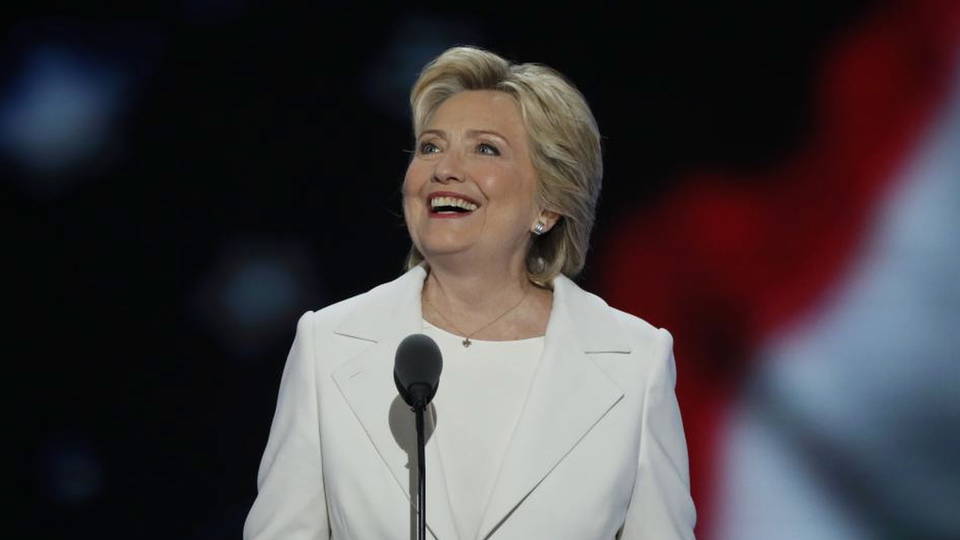
Here in Philadelphia, former Secretary of State Hillary Clinton has become the first woman to accept a major-party presidential nomination in U.S. history.
Hillary Clinton: "Tonight, we’ve reached a milestone in our nation’s march toward a more perfect union: the first time that a major party has nominated a woman for president. Standing here as my mother’s daughter and my daughter’s mother, I am so happy this day has come. I’m happy for grandmothers and little girls and everyone in between. I’m happy for boys and men, because when any barrier falls in America, it clears the way for everyone."
That was Hillary Clinton, the first woman nominated for the presidency by a major party. During her speech, Clinton also pledged to work with Vermont Senator Bernie Sanders to implement some of his core proposals.
Hillary Clinton: "Bernie Sanders and I will work together to make college tuition-free for the middle class and debt-free for all. We will also—we will also liberate millions of people who already have student debt."
TOPICS:
Hillary Clinton
DNC 2016
2016 Election
Sarah McBride is First Trans Woman to Address Major-Party Convention
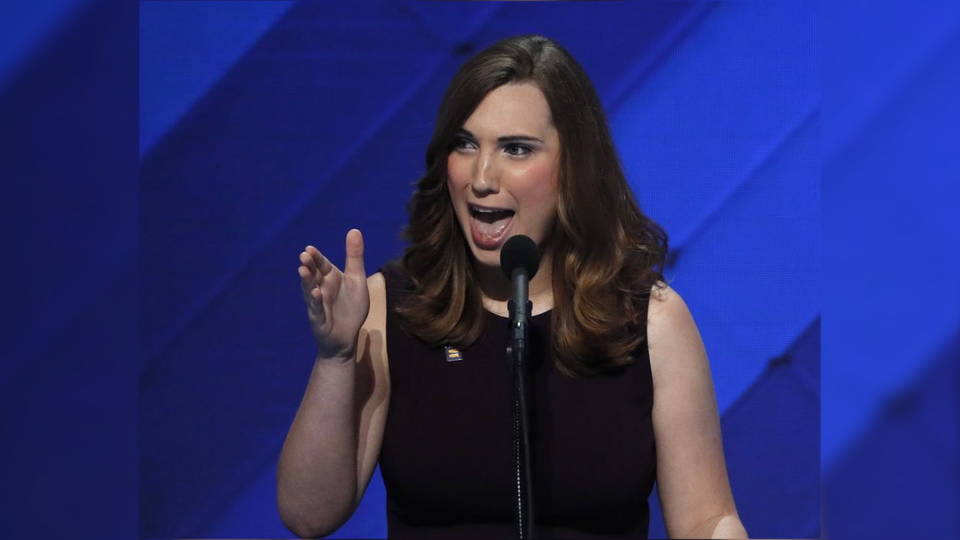
Hillary Clinton’s address came at the end of a day packed with speakers, including her daughter, Chelsea Clinton; retired four-star Marine General John Allen; civil rights legend Dolores Huerta; "Moral Mondays" leader Reverend William Barber; and LGBTrights activist Sarah McBride, who became the first openly transgender woman to speak at a major-party convention.
Sarah McBride: Will we be a nation where there’s only one way to love, only one way to look and only one way to live? Or will we be a nation where everyone has the freedom to live openly and equally, a nation that’s stronger together?"
TOPICS:
DNC 2016
Muslim Father of Son Killed Serving in Iraq Offers Trump Copy of U.S. Constitution
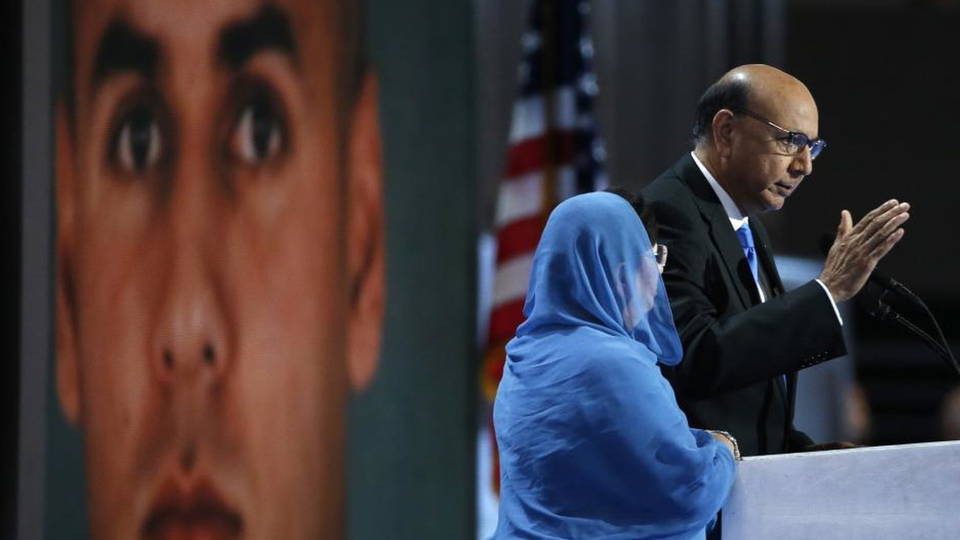
One of the most powerful speakers Thursday was Khizr Khan, whose son died in 2004 serving in the U.S. war in Iraq. This is Khan addressing Donald Trump.
Khizr Khan: "Donald Trump, you’re asking Americans to trust you with their future. Let me ask you, have you even read the United States Constitution? I will gladly lend you my copy."
That’s Khizr Khan. His son, U.S. Army Captain Humayun Khan, was posthumously awarded the Bronze Star and Purple Heart after he was killed in Iraq. While Khan’s speech was broadcast by CNN and MSNBC, Fox News did not play the speech, instead choosing to air commercials. Fox News also did not play Tuesday’s DNCspeeches of the mothers of Sandra Bland, Jordan Davis and Trayvon Martin, instead airing an interview with Karl Rove and a segment about immigration moderated by Bill O’Reilly.
TOPICS:
DNC 2016
Donald Trump
NBA Star Kareem Abdul-Jabbar Says He's Michael Jordan "Because Trump Couldn't Tell Difference"
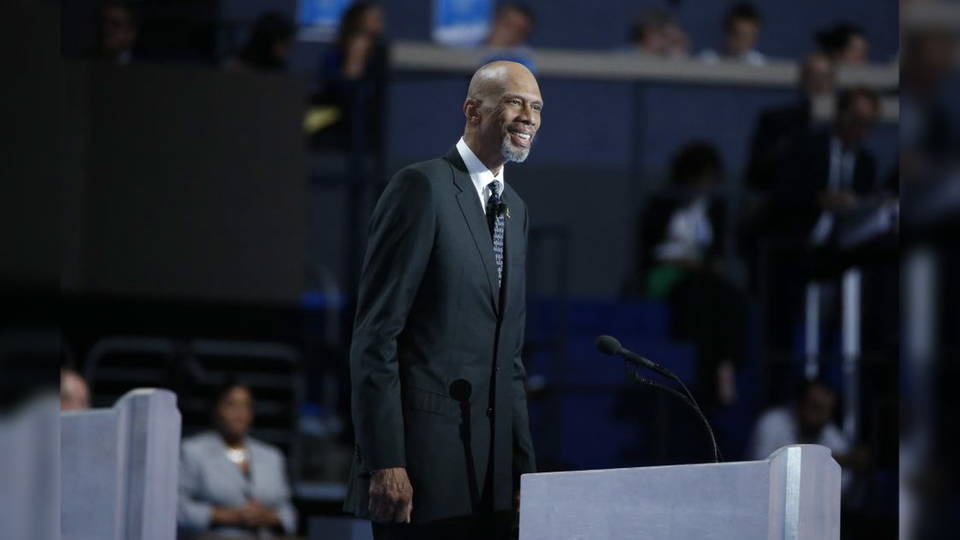
Retired NBA star Kareem Abdul-Jabbar also spoke Thursday. He opened his speech with a jab at Donald Trump.
Kareem Abdul-Jabbar: "Hello, everyone. I’m Michael Jordan, and I’m here with Hillary. I said that because I know that Donald Trump couldn’t tell the difference."
Then he went on to really introduce himself as Kareem Abdul-Jabbar, the NBA’s all-time leading scorer.
TOPICS:
DNC 2016
Donald Trump
Ohio Rep. Joyce Beatty "Plagiarizes" Melania Trump's Dress
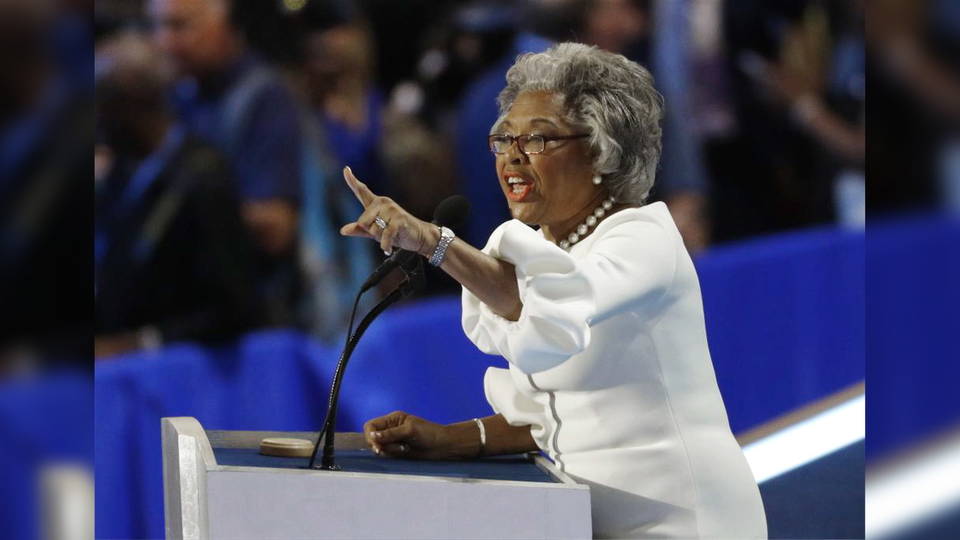
Ohio Congressmember Joyce Beatty also appeared to take a jab at the Trumps on Thursday when she took the DNC stage wearing the exact same off-white dress with billowing sleeves that Melania Trump wore when she gave her speech at the RNC in Cleveland last week. This fashion "plagiarism" mocked Melania Trump plagiarizing parts of Michelle Obama speech from the 2008 DNC speech. Meanwhile, Donald Trump Jr. is accusing President Obama of having plagiarized a line from his speech at the RNC last week. Both men used the phrase "That’s not the America I know." However, well before the RNC, President Obama has used some variant of the phrase "the America I know" or "not the America I know" on multiple occasions. Former President George W. Bush also used this phrase.
TOPICS:
DNC 2016
Sanders Delegates Walk Off DNC Convention Floor in Protest
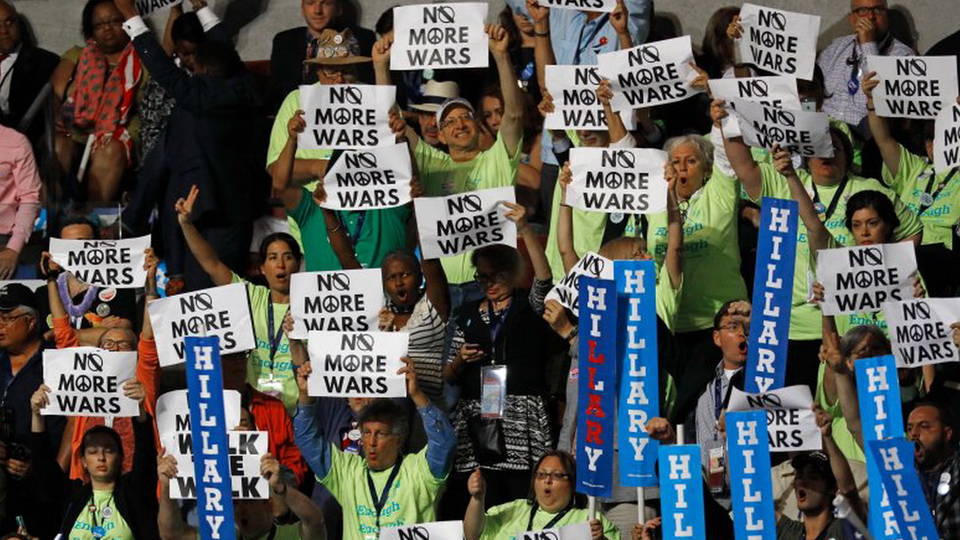
Back in Philadelphia, Bernie Sanders delegates protested both on and off the convention floor Thursday. Scores of Sanders delegates wore fluorescent green shirts reading "Enough is Enough," which appeared to glow in the dark whenever the arena lights dimmed in between speakers. Many of these delegates also held signs reading "No More Wars," "Ban Fracking Now," "#DNC Email Leaks" and "Jill Stein." Toward the end of Thursday night, about a half-dozen young black activists marched out of the convention arena chanting "Black Lives Matter." Other groups of Colorado and California delegates also walked off the floor, the Californians saying their votes hadn’t been counted. It took California a full month to count the votes following the June 7 primary.
TOPICS:
DNC 2016
Bernie Sanders
Hillary Clinton
As Hillary Clinton Speaks Inside Convention, Hundreds Protest Outside Arena
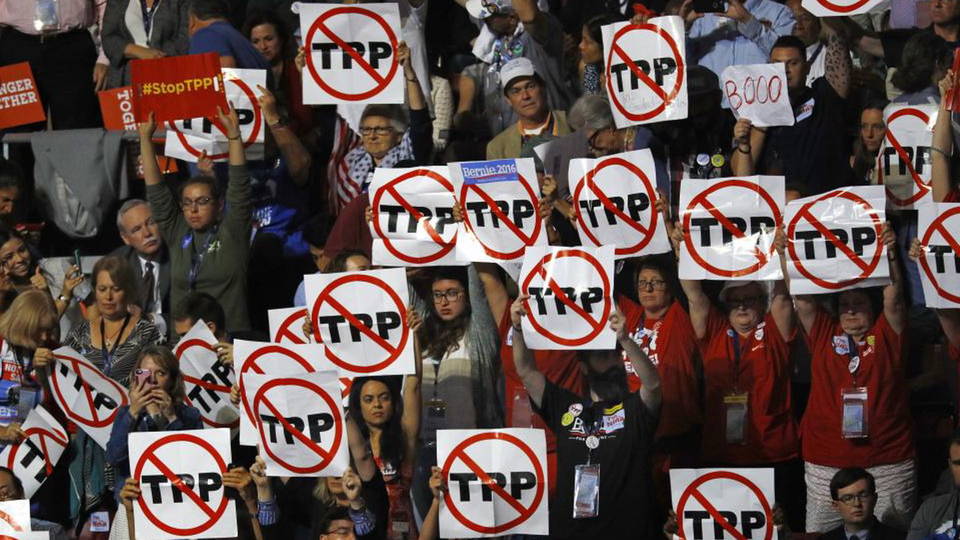
Meanwhile, hundreds of protesters rallied outside the Wells Fargo Center Thursday night. One protester spoke about the impacts of Bill Clinton’s welfare reform on her family. This is Jacinta Mack.
Jacinta Mack: "The monthly money that we got was cut. And then the subsidized housing was also cut. And my mother was required to go out and apply for a certain number of jobs, but she was a single mother of six children and wasn’t able to meet their requirements. We struggled tremendously. And my mother actually became a sex worker."
Seattle City Councilmember Kshama Sawant also addressed the crowd.
Kshama Sawant: "But what’s happening here is this. Sanders has decided to endorse Clinton, but you can see thousands of people and the Democratic Party’s own delegates do not accept that, because that is not a way forward. That’s a failed strategy, putting our faith in the corporate two parties. So, here, people are here to say that they refuse, they reject that move, and we want to build our independent movement. We want to greet the brave delegates who are going to walk out during Hillary’s speech, so we can discuss where we go from here."
We’ll host a debate between Seattle City Councilmember Kshama Sawant and Rebecca Traister, New York Magazine writer, after headlines.
TOPICS:
DNC 2016
Delegates Given Chants to Counter Sanders Delegates' Protests
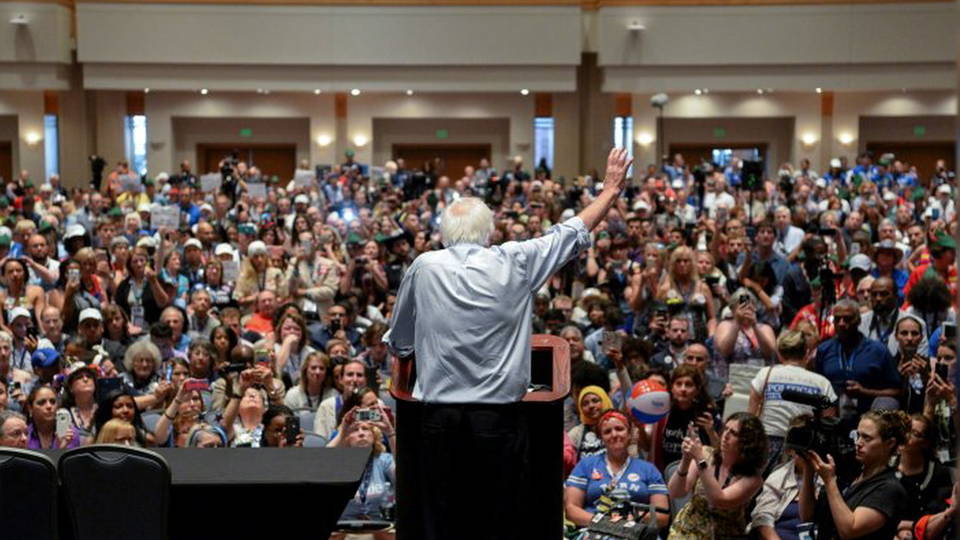
Meanwhile, The Guardian’s Ben Jacobs reported the Democratic Party tried to thwart protest chants from the floor by circulating a list of counter chants on Thursday. Clinton delegates were reportedly instructed to chant "U.S.A." when Sanders delegates chanted "No more war," and "Hillary" when Sanders delegates chanted "Stop the TPP." Despite these efforts, the protest chants could still be heard from the floor, although they were largely drowned out for television audiences.
TOPICS:
DNC 2016
Bernie Sanders
Hillary Clinton
Sanders Delegate: DNC Stripped My Credentials for Holding "No TPP" Sign
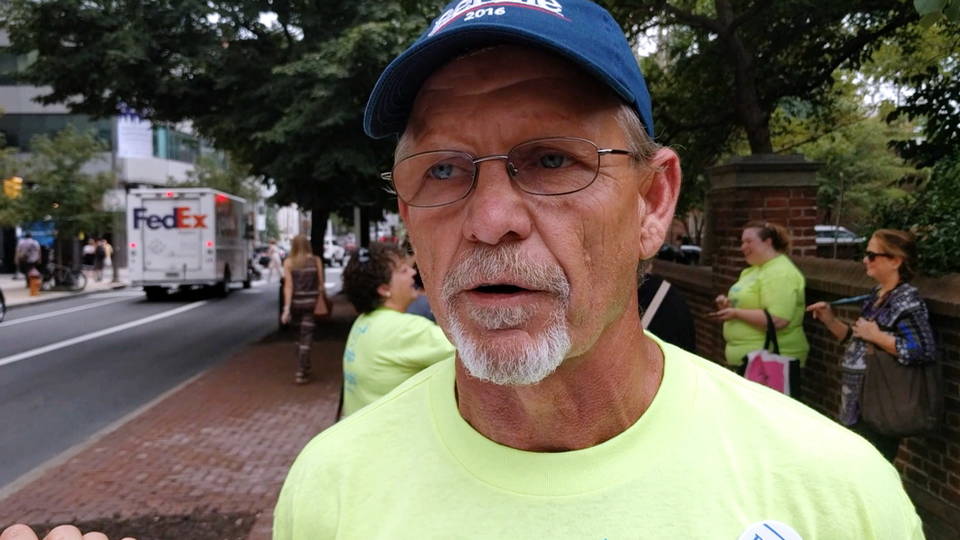
This comes as at least one Sanders delegate is saying his credentials were stripped from him after he held a protest sign during President Obama’s speech Wednesday night.
Frank Klein: "I’m Frank Klein. I’m a 61-year-old delegate from Arkansas Congressional District 4. I’m here to represent my—I’m a Bernie delegate. They had told me, because I held up a "No TPP" sign during the Obama speech—I didn’t yell, I didn’t make a commotion, I just held up a sign—that it’s against DNC rules for me to use an unofficial sign, and they refused to give me my credentials to go to the convention on the fourth day. I feel like this is a violation of my constitutional rights to free speech."
TOPICS:
Bernie Sanders
DNC 2016
Donald Trump on DNC Speakers: "I Was Going to Hit Them"
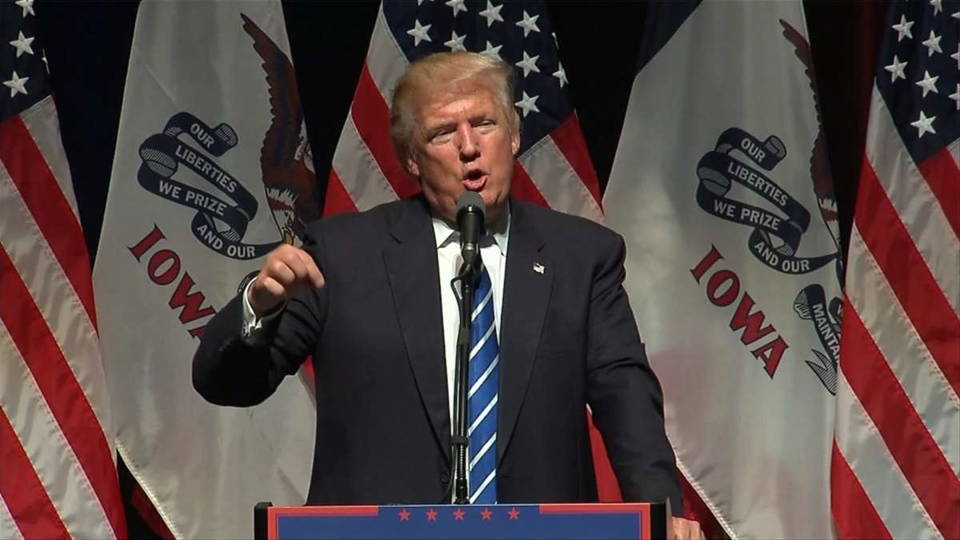
Donald Trump hasn’t appreciated all the jabs and jokes at his expense during this week’s DNC. At a rally in Davenport, Iowa, Thursday, Trump talked about attacking multiple DNC speakers.
Donald Trump: "I wanted to hit a couple of those speakers so hard. I would have hit them—no, no. I was going to hit them. I was all set. And then I got a call from a highly respected governor: ’How’s it going, Donald?’ I said, 'Well, it's going good, but they’re really saying bad things about me. I’m going to hit them so hard.’ I was going to hit one guy in particular, a very little guy. I was going to hit this guy so hard, his head would spin, he wouldn’t know what the hell happened."
TOPICS:
Donald Trump
DNC 2016
Baltimore Prosecutors Say Police Undermined Freddie Gray Cases
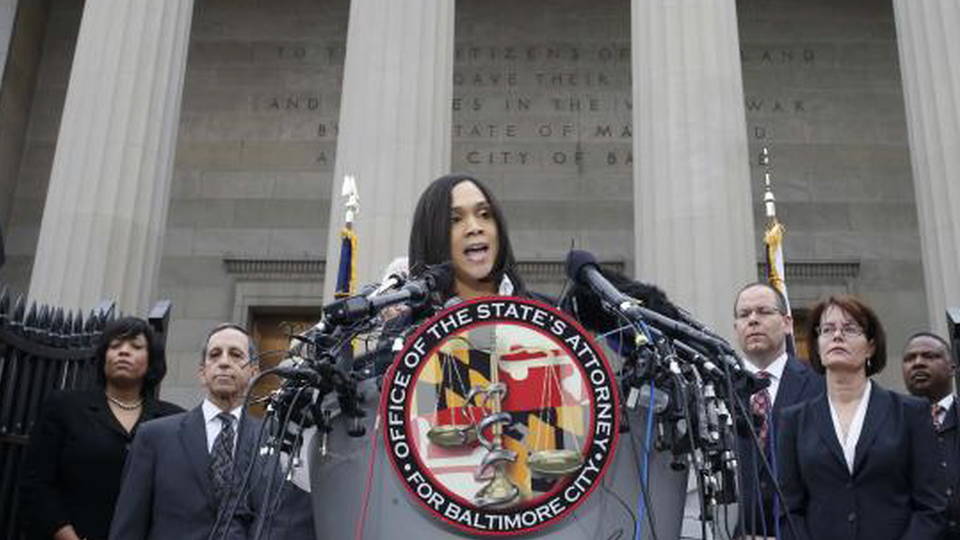
In news from Baltimore, the prosecutors who failed to secure convictions for police officers after the death of Freddie Gray say the city’s police department undermined their case. Prosecutors Michael Schatzow and Janice Bledsoe say police failed to serve search warrants for police cellphones that would have offered evidence of how officers reacted after Gray’s death. Gray died in April 2015 of spinal injuries after he was arrested and transported in a police van. Six officers faced charges related to his death, but prosecutors dropped all remaining charges against three officers Wednesday after failing to win convictions for any of the first four officers to go on trial. Five of the officers have also filed suit against Baltimore City State’s Attorney Marilyn Mosby, alleging defamation and unlawful arrest.
TOPICS:
Freddie Gray
Police Brutality
Ramsey Orta Sues New York City for $10 Million for Retaliation
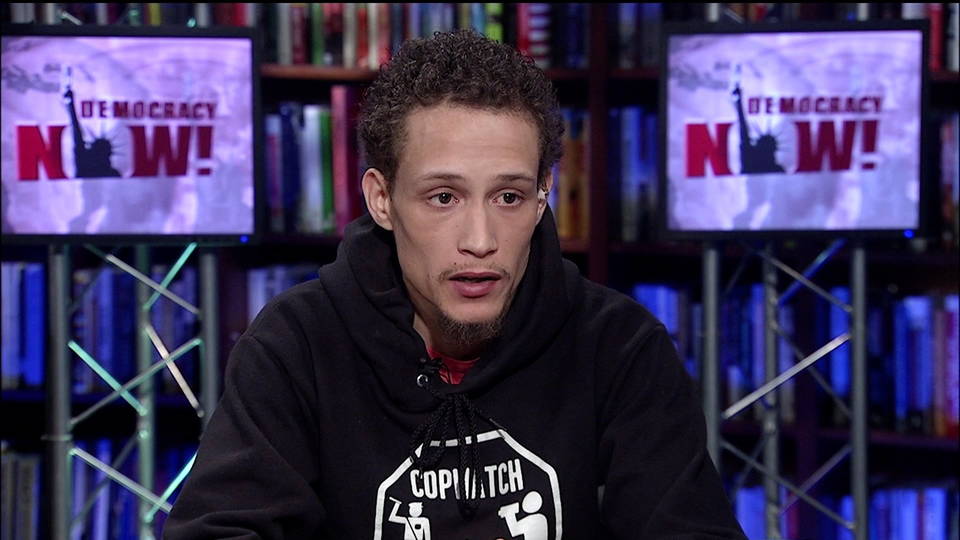
Meanwhile, the man who recorded Eric Garner’s death is suing New York City for $10 million. Ramsey Orta says he was arrested on trumped-up drug charges as payback for filming the fatal police chokehold that killed Eric Garner on July 17, 2014. Under a plea deal, Orta is slated to serve four years in jail—making him the only person at the scene of Eric Garner’s death who will serve jail time.
TOPICS:
Eric Garner
Police Brutality
Trump Running Mate Mike Pence to Address ALEC Meeting
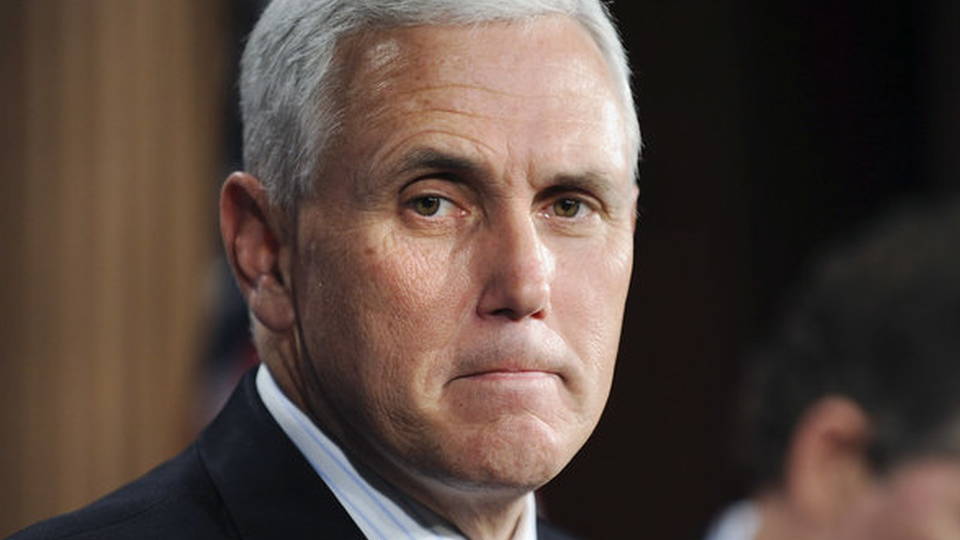
Republican vice-presidential nominee Mike Pence is scheduled to address the American Legislative Exchange Council’s annual conference today. ALEC is a right-wing group that proposes legislative language that is then used by lawmakers. More than 100 protesters gathered outside the conference on Wednesday.
TOPICS:
Donald Trump
ALEC
Chelsea Manning Faces New Charges After Suicide Attempt
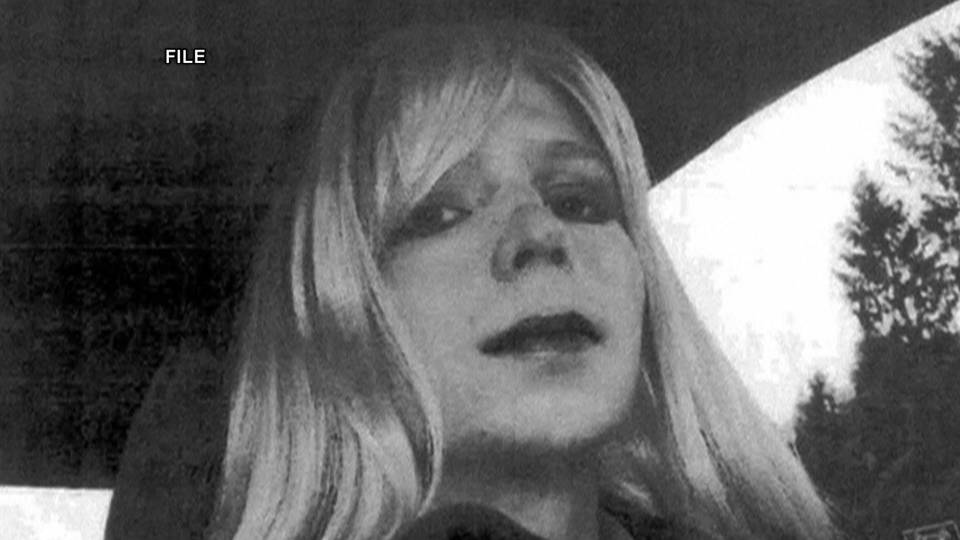
Imprisoned Army whistleblower Chelsea Manning faces new charges after she tried to commit suicide on July 5. The Army told Manning yesterday she is being investigated on charges that include having prohibited property in her cell and resisting being moved out of the cell. If convicted, Manning could face punishment including indefinite solitary confinement and additional time in prison. It could also negate the chance of parole. Manning is serving a 35-year sentence at Fort Leavenworth, Kansas.
TOPICS:
Chelsea Manning
Jessica Valenti Quits Social Media After Rape Threat to Her Child
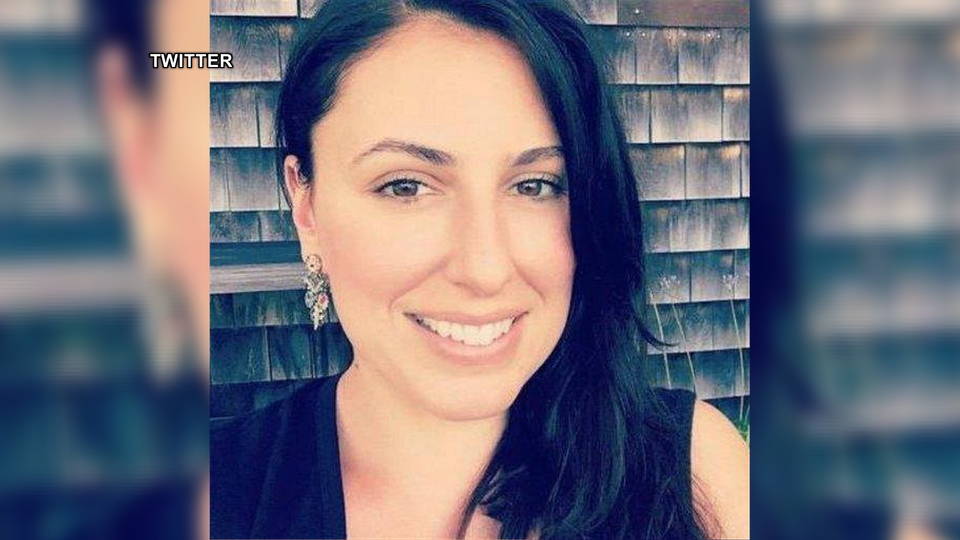
Best-selling author and feminist writer Jessica Valenti has quit using social media indefinitely, after she received a rape threat aimed at her child. Valenti has long received violent threats online as a result of her feminist writing. But on Wednesday she tweeted, "This morning I woke up to a rape and death threat directed at my 5 year old daughter. That this is part of my work life is unacceptable." In another tweet, she added, "I can’t live like this."
Iraq: U.S. Military Expands Role of Troops
The Pentagon has announced it is expanding an "advise and assist mission" for U.S. troops in Iraq as some of them are deploying along with a conventional Iraqi army unit for the first time in years. In April, President Obama authorized U.S. combat advisers to deploy with Iraqi army forces at lower levels. Until then, they had been largely confined to bases and special forces missions. The announcement comes as officers have spoken about an "imminent" offensive against Mosul, the largest city held by ISIS. Earlier this month, the Pentagon raised the number of soldiers in Iraq to more than 4,600. There are also at least 3,000 U.S. military contractors in the country.
Clinton Running Mate Tim Kaine Pushes for More Israeli Military Funding

Thirty-six senators, including Democratic vice-presidential nominee Tim Kaine, are pushing to add $320 million for Israeli missile defense to next year’s defense appropriations bill. That’s in addition to the $3 billion a year in military funding the U.S. currently gives Israel. The proposed increase includes more purchases of Iron Dome systems, designed to intercept missiles fired toward Israel from Palestine. President Obama has threatened to veto legislation with that level of funding for the program.
TOPICS:
Israel
Syria: Observers Say Another U.S. Strike Kills Dozens of Civilians

The Syrian Observatory for Human Rights is reporting another U.S. strike has killed civilians in northern Syria. The Observatory says the strike near the city of Manbij killed at least 28 civilians Thursday. A U.S.-backed militia has been fighting ISIS for control of Manbij since May. The Observatory and other groups say three U.S. strikes in the area have killed at least 200 civilians since the offensive began.
TOPICS:
Syria
Syria: Al-Nusra Breaks from Al-Qaeda's Global Leadership

Meanwhile, al-Qaeda’s Syrian branch has announced it has broken with al-Qaeda’s global leadership. The Nusra Front controls significant portions of northern Syria. It is listed as a terrorist organization by the U.S., but weapons funneled to rebels by the U.S. and its allies have routinely fallen into the hands of the group.
TOPICS:
Syria
U.S. Gov't Pays Family of Italian Aid Worker Killed by Drone Strike
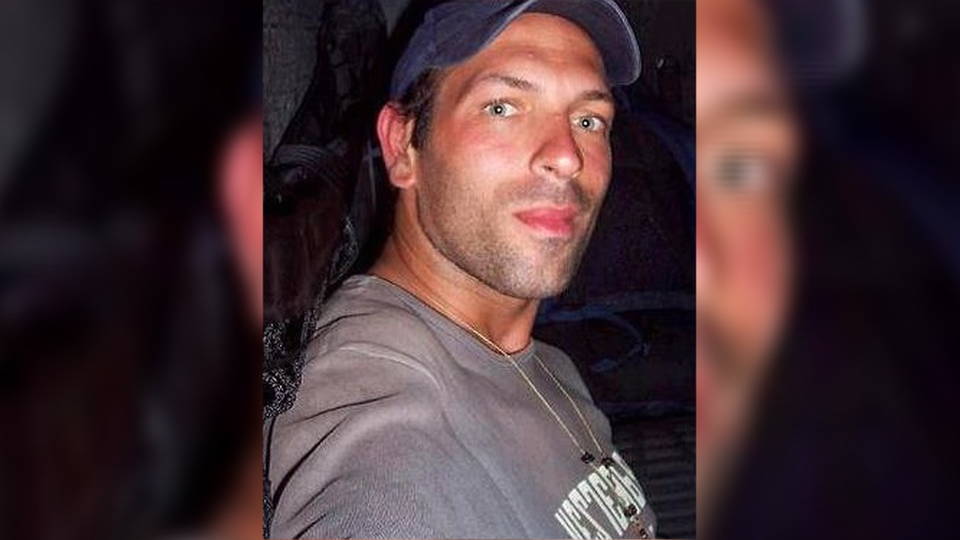
And the U.S. government has reached an agreement with the family of Giovanni Lo Porto, an Italian aid worker killed in a CIA drone strike in Pakistan last year. Lawyers for the family told The Intercept the government had paid compensation, but did not disclose the amount. The agreement comes more than a year after President Obama acknowledged and apologized for the operation, which killed Lo Porto and a U.S. government contractor named Warren Weinstein. Despite hundreds of hours of surveillance, Obama said the United States had not known that the hostages were present.
TOPICS:
Drone Attacks
Drones
Navy to Name Ship After Harvey Milk, Who Opposed Vietnam War
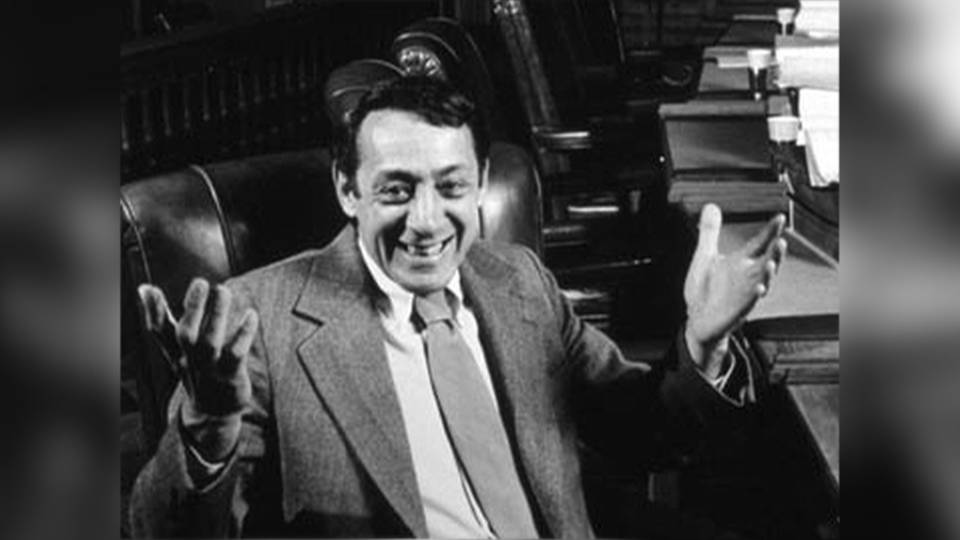
And the U.S. Navy is naming a ship after Harvey Milk. Milk was murdered in 1978 after becoming one of the nation’s first openly gay elected officials. He served in the Navy in the 1950s, but he went on to become an outspoken opponent of the Vietnam War. The proposal to name a Navy ship after Milk has faced opposition from some members of San Francisco’s LGBT community for years. When the idea was first proposed, queer activist Tommi Avicolli Mecca said, "It seems inappropriate and insensitive to name a Navy ship after a gay man who opposed the Vietnam War and war in general."
SPEAKING EVENTS

7/29 Provincetown, MA
7/30 Martha's Vineyard, MA
Donate today:
Follow:



COLUMN

The Liberty Bell and the Democratic Party: A Tale of Two Fractures in Philadelphia
WEB EXCLUSIVE

Joseph Stiglitz to Clinton: Don't Repeat Obama Mistakes of Supporting TPP, Failed Financial Reform
WEB EXCLUSIVE

Immigrants March on the DNC, Call to Shut Down Berks Family Detention Center in Pennsylvania
NEW BOOK

Democracy Now!: Twenty Years Covering the Movements Changing America
WEB EXCLUSIVE

Former VT Delegate Who Joined Sanders at Roll Call: "How Do We Move Forward Without Compromise?"
WEB EXCLUSIVE

"UnConventional Times": Activists at DNC Publish Independent Newspaper to Cover Protests, Walkouts
WORK WITH DN!

Senior TV Producer
Development Manager
SPECIAL COVERAGE

Special Expanded 2-Hour Broadcasts from the RNC and DNC—July 18-29
WEB EXCLUSIVE

Nuns on the Bus at the DNC: Sister Simone Campbell on Abortion Rights, Wealth Gap, Kaine in Honduras
207 West 25th Street, 11th Floor
Hillary Clinton Becomes First Woman to Accept Major-Party Nomination

Here in Philadelphia, former Secretary of State Hillary Clinton has become the first woman to accept a major-party presidential nomination in U.S. history.
Hillary Clinton: "Tonight, we’ve reached a milestone in our nation’s march toward a more perfect union: the first time that a major party has nominated a woman for president. Standing here as my mother’s daughter and my daughter’s mother, I am so happy this day has come. I’m happy for grandmothers and little girls and everyone in between. I’m happy for boys and men, because when any barrier falls in America, it clears the way for everyone."
That was Hillary Clinton, the first woman nominated for the presidency by a major party. During her speech, Clinton also pledged to work with Vermont Senator Bernie Sanders to implement some of his core proposals.
Hillary Clinton: "Bernie Sanders and I will work together to make college tuition-free for the middle class and debt-free for all. We will also—we will also liberate millions of people who already have student debt."
TOPICS:
Hillary Clinton
DNC 2016
2016 Election
Sarah McBride is First Trans Woman to Address Major-Party Convention

Hillary Clinton’s address came at the end of a day packed with speakers, including her daughter, Chelsea Clinton; retired four-star Marine General John Allen; civil rights legend Dolores Huerta; "Moral Mondays" leader Reverend William Barber; and LGBTrights activist Sarah McBride, who became the first openly transgender woman to speak at a major-party convention.
Sarah McBride: Will we be a nation where there’s only one way to love, only one way to look and only one way to live? Or will we be a nation where everyone has the freedom to live openly and equally, a nation that’s stronger together?"
TOPICS:
DNC 2016
Muslim Father of Son Killed Serving in Iraq Offers Trump Copy of U.S. Constitution

One of the most powerful speakers Thursday was Khizr Khan, whose son died in 2004 serving in the U.S. war in Iraq. This is Khan addressing Donald Trump.
Khizr Khan: "Donald Trump, you’re asking Americans to trust you with their future. Let me ask you, have you even read the United States Constitution? I will gladly lend you my copy."
That’s Khizr Khan. His son, U.S. Army Captain Humayun Khan, was posthumously awarded the Bronze Star and Purple Heart after he was killed in Iraq. While Khan’s speech was broadcast by CNN and MSNBC, Fox News did not play the speech, instead choosing to air commercials. Fox News also did not play Tuesday’s DNCspeeches of the mothers of Sandra Bland, Jordan Davis and Trayvon Martin, instead airing an interview with Karl Rove and a segment about immigration moderated by Bill O’Reilly.
TOPICS:
DNC 2016
Donald Trump
NBA Star Kareem Abdul-Jabbar Says He's Michael Jordan "Because Trump Couldn't Tell Difference"

Retired NBA star Kareem Abdul-Jabbar also spoke Thursday. He opened his speech with a jab at Donald Trump.
Kareem Abdul-Jabbar: "Hello, everyone. I’m Michael Jordan, and I’m here with Hillary. I said that because I know that Donald Trump couldn’t tell the difference."
Then he went on to really introduce himself as Kareem Abdul-Jabbar, the NBA’s all-time leading scorer.
TOPICS:
DNC 2016
Donald Trump
Ohio Rep. Joyce Beatty "Plagiarizes" Melania Trump's Dress

Ohio Congressmember Joyce Beatty also appeared to take a jab at the Trumps on Thursday when she took the DNC stage wearing the exact same off-white dress with billowing sleeves that Melania Trump wore when she gave her speech at the RNC in Cleveland last week. This fashion "plagiarism" mocked Melania Trump plagiarizing parts of Michelle Obama speech from the 2008 DNC speech. Meanwhile, Donald Trump Jr. is accusing President Obama of having plagiarized a line from his speech at the RNC last week. Both men used the phrase "That’s not the America I know." However, well before the RNC, President Obama has used some variant of the phrase "the America I know" or "not the America I know" on multiple occasions. Former President George W. Bush also used this phrase.
TOPICS:
DNC 2016
Sanders Delegates Walk Off DNC Convention Floor in Protest

Back in Philadelphia, Bernie Sanders delegates protested both on and off the convention floor Thursday. Scores of Sanders delegates wore fluorescent green shirts reading "Enough is Enough," which appeared to glow in the dark whenever the arena lights dimmed in between speakers. Many of these delegates also held signs reading "No More Wars," "Ban Fracking Now," "#DNC Email Leaks" and "Jill Stein." Toward the end of Thursday night, about a half-dozen young black activists marched out of the convention arena chanting "Black Lives Matter." Other groups of Colorado and California delegates also walked off the floor, the Californians saying their votes hadn’t been counted. It took California a full month to count the votes following the June 7 primary.
TOPICS:
DNC 2016
Bernie Sanders
Hillary Clinton
As Hillary Clinton Speaks Inside Convention, Hundreds Protest Outside Arena

Meanwhile, hundreds of protesters rallied outside the Wells Fargo Center Thursday night. One protester spoke about the impacts of Bill Clinton’s welfare reform on her family. This is Jacinta Mack.
Jacinta Mack: "The monthly money that we got was cut. And then the subsidized housing was also cut. And my mother was required to go out and apply for a certain number of jobs, but she was a single mother of six children and wasn’t able to meet their requirements. We struggled tremendously. And my mother actually became a sex worker."
Seattle City Councilmember Kshama Sawant also addressed the crowd.
Kshama Sawant: "But what’s happening here is this. Sanders has decided to endorse Clinton, but you can see thousands of people and the Democratic Party’s own delegates do not accept that, because that is not a way forward. That’s a failed strategy, putting our faith in the corporate two parties. So, here, people are here to say that they refuse, they reject that move, and we want to build our independent movement. We want to greet the brave delegates who are going to walk out during Hillary’s speech, so we can discuss where we go from here."
We’ll host a debate between Seattle City Councilmember Kshama Sawant and Rebecca Traister, New York Magazine writer, after headlines.
TOPICS:
DNC 2016
Delegates Given Chants to Counter Sanders Delegates' Protests

Meanwhile, The Guardian’s Ben Jacobs reported the Democratic Party tried to thwart protest chants from the floor by circulating a list of counter chants on Thursday. Clinton delegates were reportedly instructed to chant "U.S.A." when Sanders delegates chanted "No more war," and "Hillary" when Sanders delegates chanted "Stop the TPP." Despite these efforts, the protest chants could still be heard from the floor, although they were largely drowned out for television audiences.
TOPICS:
DNC 2016
Bernie Sanders
Hillary Clinton
Sanders Delegate: DNC Stripped My Credentials for Holding "No TPP" Sign

This comes as at least one Sanders delegate is saying his credentials were stripped from him after he held a protest sign during President Obama’s speech Wednesday night.
Frank Klein: "I’m Frank Klein. I’m a 61-year-old delegate from Arkansas Congressional District 4. I’m here to represent my—I’m a Bernie delegate. They had told me, because I held up a "No TPP" sign during the Obama speech—I didn’t yell, I didn’t make a commotion, I just held up a sign—that it’s against DNC rules for me to use an unofficial sign, and they refused to give me my credentials to go to the convention on the fourth day. I feel like this is a violation of my constitutional rights to free speech."
TOPICS:
Bernie Sanders
DNC 2016
Donald Trump on DNC Speakers: "I Was Going to Hit Them"

Donald Trump hasn’t appreciated all the jabs and jokes at his expense during this week’s DNC. At a rally in Davenport, Iowa, Thursday, Trump talked about attacking multiple DNC speakers.
Donald Trump: "I wanted to hit a couple of those speakers so hard. I would have hit them—no, no. I was going to hit them. I was all set. And then I got a call from a highly respected governor: ’How’s it going, Donald?’ I said, 'Well, it's going good, but they’re really saying bad things about me. I’m going to hit them so hard.’ I was going to hit one guy in particular, a very little guy. I was going to hit this guy so hard, his head would spin, he wouldn’t know what the hell happened."
TOPICS:
Donald Trump
DNC 2016
Baltimore Prosecutors Say Police Undermined Freddie Gray Cases

In news from Baltimore, the prosecutors who failed to secure convictions for police officers after the death of Freddie Gray say the city’s police department undermined their case. Prosecutors Michael Schatzow and Janice Bledsoe say police failed to serve search warrants for police cellphones that would have offered evidence of how officers reacted after Gray’s death. Gray died in April 2015 of spinal injuries after he was arrested and transported in a police van. Six officers faced charges related to his death, but prosecutors dropped all remaining charges against three officers Wednesday after failing to win convictions for any of the first four officers to go on trial. Five of the officers have also filed suit against Baltimore City State’s Attorney Marilyn Mosby, alleging defamation and unlawful arrest.
TOPICS:
Freddie Gray
Police Brutality
Ramsey Orta Sues New York City for $10 Million for Retaliation

Meanwhile, the man who recorded Eric Garner’s death is suing New York City for $10 million. Ramsey Orta says he was arrested on trumped-up drug charges as payback for filming the fatal police chokehold that killed Eric Garner on July 17, 2014. Under a plea deal, Orta is slated to serve four years in jail—making him the only person at the scene of Eric Garner’s death who will serve jail time.
TOPICS:
Eric Garner
Police Brutality
Trump Running Mate Mike Pence to Address ALEC Meeting

Republican vice-presidential nominee Mike Pence is scheduled to address the American Legislative Exchange Council’s annual conference today. ALEC is a right-wing group that proposes legislative language that is then used by lawmakers. More than 100 protesters gathered outside the conference on Wednesday.
TOPICS:
Donald Trump
ALEC
Chelsea Manning Faces New Charges After Suicide Attempt

Imprisoned Army whistleblower Chelsea Manning faces new charges after she tried to commit suicide on July 5. The Army told Manning yesterday she is being investigated on charges that include having prohibited property in her cell and resisting being moved out of the cell. If convicted, Manning could face punishment including indefinite solitary confinement and additional time in prison. It could also negate the chance of parole. Manning is serving a 35-year sentence at Fort Leavenworth, Kansas.
TOPICS:
Chelsea Manning
Jessica Valenti Quits Social Media After Rape Threat to Her Child

Best-selling author and feminist writer Jessica Valenti has quit using social media indefinitely, after she received a rape threat aimed at her child. Valenti has long received violent threats online as a result of her feminist writing. But on Wednesday she tweeted, "This morning I woke up to a rape and death threat directed at my 5 year old daughter. That this is part of my work life is unacceptable." In another tweet, she added, "I can’t live like this."
Iraq: U.S. Military Expands Role of Troops

The Pentagon has announced it is expanding an "advise and assist mission" for U.S. troops in Iraq as some of them are deploying along with a conventional Iraqi army unit for the first time in years. In April, President Obama authorized U.S. combat advisers to deploy with Iraqi army forces at lower levels. Until then, they had been largely confined to bases and special forces missions. The announcement comes as officers have spoken about an "imminent" offensive against Mosul, the largest city held by ISIS. Earlier this month, the Pentagon raised the number of soldiers in Iraq to more than 4,600. There are also at least 3,000 U.S. military contractors in the country.
Clinton Running Mate Tim Kaine Pushes for More Israeli Military Funding

Thirty-six senators, including Democratic vice-presidential nominee Tim Kaine, are pushing to add $320 million for Israeli missile defense to next year’s defense appropriations bill. That’s in addition to the $3 billion a year in military funding the U.S. currently gives Israel. The proposed increase includes more purchases of Iron Dome systems, designed to intercept missiles fired toward Israel from Palestine. President Obama has threatened to veto legislation with that level of funding for the program.
TOPICS:
Israel
Syria: Observers Say Another U.S. Strike Kills Dozens of Civilians

The Syrian Observatory for Human Rights is reporting another U.S. strike has killed civilians in northern Syria. The Observatory says the strike near the city of Manbij killed at least 28 civilians Thursday. A U.S.-backed militia has been fighting ISIS for control of Manbij since May. The Observatory and other groups say three U.S. strikes in the area have killed at least 200 civilians since the offensive began.
TOPICS:
Syria
Syria: Al-Nusra Breaks from Al-Qaeda's Global Leadership

Meanwhile, al-Qaeda’s Syrian branch has announced it has broken with al-Qaeda’s global leadership. The Nusra Front controls significant portions of northern Syria. It is listed as a terrorist organization by the U.S., but weapons funneled to rebels by the U.S. and its allies have routinely fallen into the hands of the group.
TOPICS:
Syria
U.S. Gov't Pays Family of Italian Aid Worker Killed by Drone Strike

And the U.S. government has reached an agreement with the family of Giovanni Lo Porto, an Italian aid worker killed in a CIA drone strike in Pakistan last year. Lawyers for the family told The Intercept the government had paid compensation, but did not disclose the amount. The agreement comes more than a year after President Obama acknowledged and apologized for the operation, which killed Lo Porto and a U.S. government contractor named Warren Weinstein. Despite hundreds of hours of surveillance, Obama said the United States had not known that the hostages were present.
TOPICS:
Drone Attacks
Drones
Navy to Name Ship After Harvey Milk, Who Opposed Vietnam War

And the U.S. Navy is naming a ship after Harvey Milk. Milk was murdered in 1978 after becoming one of the nation’s first openly gay elected officials. He served in the Navy in the 1950s, but he went on to become an outspoken opponent of the Vietnam War. The proposal to name a Navy ship after Milk has faced opposition from some members of San Francisco’s LGBT community for years. When the idea was first proposed, queer activist Tommi Avicolli Mecca said, "It seems inappropriate and insensitive to name a Navy ship after a gay man who opposed the Vietnam War and war in general."
SPEAKING EVENTS

7/29 Provincetown, MA
7/30 Martha's Vineyard, MA
Donate today:
Follow:




COLUMN

The Liberty Bell and the Democratic Party: A Tale of Two Fractures in Philadelphia
WEB EXCLUSIVE

Joseph Stiglitz to Clinton: Don't Repeat Obama Mistakes of Supporting TPP, Failed Financial Reform
WEB EXCLUSIVE

Immigrants March on the DNC, Call to Shut Down Berks Family Detention Center in Pennsylvania
NEW BOOK

Democracy Now!: Twenty Years Covering the Movements Changing America
WEB EXCLUSIVE

Former VT Delegate Who Joined Sanders at Roll Call: "How Do We Move Forward Without Compromise?"
WEB EXCLUSIVE

"UnConventional Times": Activists at DNC Publish Independent Newspaper to Cover Protests, Walkouts
WORK WITH DN!

Senior TV Producer
Development Manager
SPECIAL COVERAGE

Special Expanded 2-Hour Broadcasts from the RNC and DNC—July 18-29
WEB EXCLUSIVE

Nuns on the Bus at the DNC: Sister Simone Campbell on Abortion Rights, Wealth Gap, Kaine in Honduras
207 West 25th Street, 11th Floor
New York, New York 10001, United States
---------------------
---------------------
No comments:
Post a Comment